#though then it was with the Finnish names and like both Finland and Russia and i think Sweden a few times???
Text
The bus to Haparanda leaves early
So, I was up at the top of Sweden and had to decide where to go next, west to Norway or east to Finland.
In the end I decided on neither and went back down through Sweden.
When I was leaving Kiruna though it looked like I was going to Finland, that was the plan anyway.
I decided on going to Haparanda (what a great name) which is on the border with Finland.
Only trouble was the bus leaves, the only bus to Haparanda, leaves at 07.10.
I get to the bus station 20 minutes before the bus leaves.
I’m the only passenger that does the full trip.
We have three different drivers over the 6 hour trip through snow filled Sweden.
The only reindeer we see over the course of the trip are in a sort of farm.
We get to Haparanda after 13.00 and I walk to the hostel through the ice and slush covered paths.
The city has a strange feel to it, a sort of half a city feel to it.
And in a way it is.
Next door in Finland is Tornio, the original settlement in the area. Then when Sweden lost Finland to Russia they needed a base for trade in that region, on their land as it were, so they built up Haparanda.
Today there’s no border control as Sweden and Finland are both members of the European Union.
The two cities have banded together and created a joint city in effect, a Eurocity.
The hostel has a sign up saying that the reception is only open from 16.00 to 19.00, I knew about this in advance but turn up anyway.
I ring the ‘out of hours’ number on their sign.
A lady opens the door and asks if it was me that was ringing, she’s not happy for whatever reason.
I ask if they’re open.
She agrees to 'sort of open’.
She checks me in and again with the sheets.
She wants to charge me 50 Swedish Krona for sheet 'rental’. That's Euro5.60 or $7.40.
I have my own sheets but thanks anyway.
She has a certificate for helpfulness on the wall behind her, NOT!
I put my stuff away and walk to the nearby IKEA, their most northerly store in the world.
I have a not very pleasant meal composed of some kind of meat.
It’s mostly Finns that are shopping there, they pay in Euro at the food counter.
The Finnish language sounds strange after hearing nothing but Swedish for the past week and a half.
My Swedish is non-existent but I’d become used to hearing it and used to the Swedish way of things, their bread, their ubiquitous cinnamon buns, kanelbulle.
They even go as far as to dedicate a day a year to their buns, 04 October is Kanelbullens dag or Cinnamon bun day. http://scandinavianfood.about.com/od/coffeecakessweetbreads/r/cinnamonrolls.htm
The Finns suddenly looked quite different from the Swedes, not as stylish, more brusque.
The shopping centre is quite new but about a third of the units haven’t opened.
There are a couple of fast food restaurants and few cheap clothes and a few over priced ones, a couple of mobile phone shops and that’s about it.
If this was Sweden there’d be people around every corner in little cafés drinking coffee and every third shop would be a flower shop.
The prices in the Finnish supermarket, on the Finnish side of the river, made me wonder about how travelling in Finland would compare to Sweden.
Sweden is considered to be one of the more expensive countries in Europe but from what I could see Finland was giving them a fair run for their money and in many cases coming in ahead of them.
The next morning I walk to the Finnish side of the river and search out the bus station.
It’s a Saturday morning so the bus station is closed, don’t bus stations the world over close on Saturdays?
The signs in Finnish that different bus companies have up in the window of the station do mention a Saturday service.
I’m annoyed and frustrated though, so I don’t give it time to work on my Finnish to figure out which column is Saturday and to figure out if the right destination I want is served by the individual companies.
So I decide I won’t be going to Rovaniemi after all.
Two Australian girls in the hostel in Kiruna had recommended the place for seeing the Northern Lights and for visiting Santa Claus in the year round Santa World close by.
I walk back across to Sweden and find that their bus station too is closed but they have a waiting room open and their electronic signs list all departures and arrivals for that day.
I felt relieved to be back where I know the set up.
Umea, half way down Sweden, is where I’m headed.
It might even be possible to catch a ferry across the Gulf of Bothnia from near there to Finland.
During the trip from Haparanda to Umea there’s enough time to watch a couple of movies.
Only trouble is they’re the same movies.
The attendant on the bus mustn’t have a very big movie collection as we’re shown 'One Day’, which we just catch the end of, then 'I Don’t Know How She Does It’ with Sarah Jessica Parker.
Then 'One Day’ again, then the Sarah Jessica Parker movie again.
Umea looks interesting and I might spend a couple of nights there. Of course it wasn’t to be.
In Umea I walk to the hostel. It's just before 20.00 at this stage.
A guest who's smoking outside lets me in.
The locked reception has a sign on it:
'Good Morning guests…. the reception will be open from 06.00 to 07.00. The Emergency Out of Hours number is …… (it cannot be used for making reservations).
Tomorrow reception will be open from 19.00-20.00’.
I walk back to the bus station, get some food and wait for the night bus to Stockholm. The bus gets me to Stockholm at 05.30.
I hang around the bus station for a couple of hours.
I go back to the hostel that I’d left a week previously before I went to the north of the country, it’s like coming home.
0 notes
Note
Finland has been independent only since 1917. Before that it was part of Russia and before that Sweden. Initially, Russia was actually better for the Finns than Sweden was, bbecause Finland was an autonomous Grand Dutcy that could do its own thing in many aspects, but then Russia started a russification campaign.
For Sweden, for hundreds of years, Finland was a conquered land of lower race mongoloids, useful as soldiers, cannon fodder, and workforce. They robbed Finland of its resources (even during a famine they demanded Finns pay the crown their taxes which were paid in grain), established colonies, didn't develop Finland beyond their colonies, used it as a buffer zone against Russia, destroyed their native religion, and forced Swedish names on people when they were in the military. It was not possible for Finns to get any higher education in their own language (and the Swedes would have been happy to see the language die out even though there weren't active campaigns to destroy it).
Note that Finnish is a Uralic language and culture, unrelated to both Swedish and Russian.
Further fun fact: there was a court case in the USA to determine if Finns could be classified as white.
See, this is why I like tumblr: I can reblog a shitpost and a helpful anon will give me the historical background for understanding it completely. Ty anon 💛
0 notes
Text
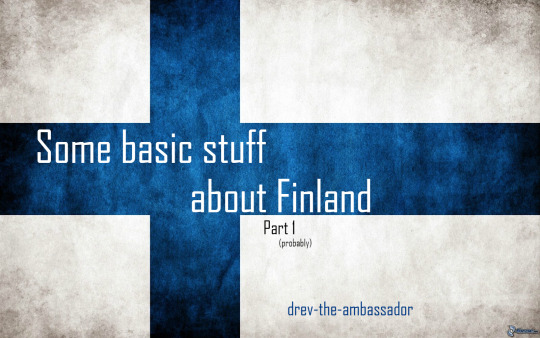
EDIT: I don’t know if it’s just me, but the pictures in this post didn’t seem to be working properly on the mobile app at first. If the pictures are all over the place and don’t seem to be getting back to normal, you might have better luck trying the web page version!
So, in case no one noticed, I haven’t made a post in a looong time. That is due to a combination of a crappy computer, lack of time and also a bit of laziness. Originally I wanted to make this post the first post on the blog, but that didn’t end up happening. While trying to answer one sports-related ask I, seeing as the post was taking forever since I had to do a lot of research and on top of that, I had to write in proper sentences, I decided it would probably be for the best to make a quick post, a list perhaps, of some basic things about Finland. So I did. It’s this post. The reason it has taken me so long to get this done is that originally I also had a history portion, but it ended up making the post too long. I then decided it would be better to make that into its own post, so I settled on making a condensed version on this one.
Turns out, condensing 800 years of history into one post and keeping it at a reasonable length is not such an easy task. Huh, who would’ve thought? That means that you’ll be getting THREE separate posts about general Finnish history! Awesome right?
Anyway, this is not that post. This is just some basic stuff, and pictures. So, without further ado:
Some basic things about Finland
Name of the country: Suomen tasavalta (the Republic of Finland)
Location: Fennoscandia (not Scandinavia!!), Northern Europe
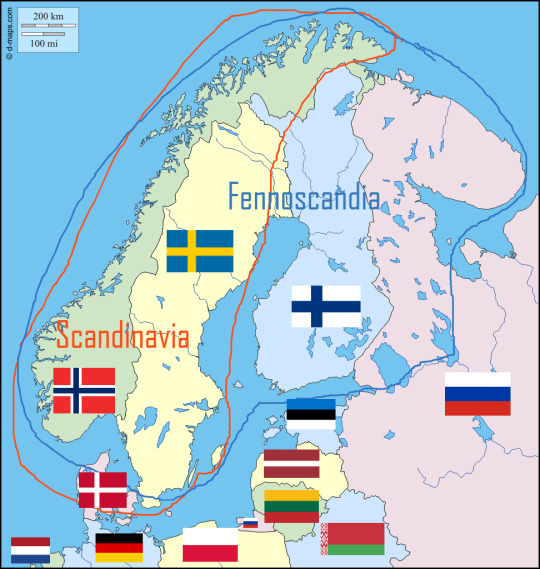
Edit made by me (as you can see from the top notch quality), but the map is from here
Neighboring countries: Norway to the north, Sweden to the west, Estonia to the south on the other side of the Gulf of Finland, Russia to the east.
Official languages: Finnish and Swedish (technically Finland Swedish)
Minority languages (mentioned in the law): Karelian, Northern Sami, Skolt Sami, Inari Sami, Finnish Romani, Finnish Sign Language and Finland Swedish Sign Language.
Languages with the most speakers:
1st: Finnish (4 865 628 people/88,7% of total population[as of 2015])
2nd: Swedish (290 161/5,3%[2015])
3rd: Russian (~75 000[as of March of 2017, same with the ones below])
4th: Estonian (~49 500)
5th: Arabic (~21 700)
6th: Somali (~19 000)
7th: English (~18 500)
President: Sauli Niinistö, 12th president of Finland. in 2018 there’ll be a new presidential election, but he’s running for president again, and there’s quite a good chance he’ll get elected again.
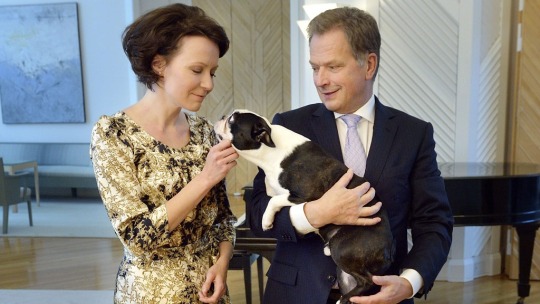
Here’s our current president with his wife Jenni Haukio and their dog, Lennu, the first dog of Finland.
Currency: Euro since 2002. From 1860 until 2002 Finland had it’s own currency, markka. 1 euro is approximately 6 markkas.
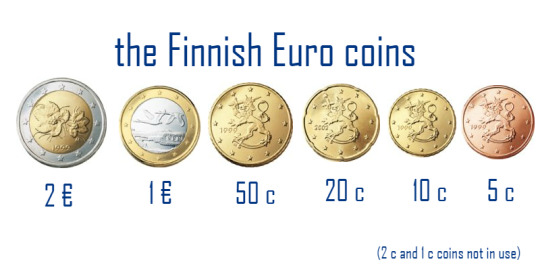
Population: 5 503 297 as of 2016
Population density: 16/km2
Size:
Area: 338 424 km2
Length: ~ 1 200 km
Width: ~ 550 km
Number of lakes: 187 888
Number of islands: 179 584
Religion:
72,0 % Evangelical Lutheran
1,1 % Orthodox Christian
1,6 % other
25,3 % none
Important holidays:
Vappu 1.5.
Juhannus 20.6.-26.6. on a Saturday
Itsenäisyyspäivä (Independence day) 6.12.
Joulu (Christmas) 24.12. is celebrated more than 25.12.
Uudenvuodenaatto (New Year’s eve) 31.12.
Other holidays:
Laskiainen (Shrove Tuesday) Seven weeks before Easter.
Pyhäinmiestenpäivä (All Saints’ Day) 31.10.-6.11. on a Saturday, NOT Halloween, we don’t celebrate it here.
Pääsiäinen (Easter) The same time it’s celebrated elsewhere.
Ruotsalaisuuden päivä (Finnish Swedish Heritage Day) 6.11.
Äitienpäivä (Mother’s day) Celebrated on the second Sunday of May.
Isänpäivä (Father’s day) Celebrated on the second Sunday of November, exactly half a year after Mother’s day.
Can you drink the tap water: Yes.
Number of saunas: 2 million - 3,2 million
Number of dogs: around 500 000 pure breeds, mixed breeds not included
Finland’s national
...anthem: Maamme, Vårt land in Swedish, Our Land in English. Composed by Fredrik Pacius, words written (first in Swedish) by J. L. Runeberg. It was performed for the first time in 1846. The Finnish translation is what made it become the national anthem, even though for a long time Finnish wasn’t even an official language in Finland.
...flag: A blue Nordic cross on a white background, the State flag also has the Coat of Arms of Finland in the middle.
...Coat of Arms: A golden crowned lion on a red background, standing on it’s hind legs, with it’s other armored front leg holding a sword, trampling a saber, with nine silver roses just kinda floating around. See for yourself.
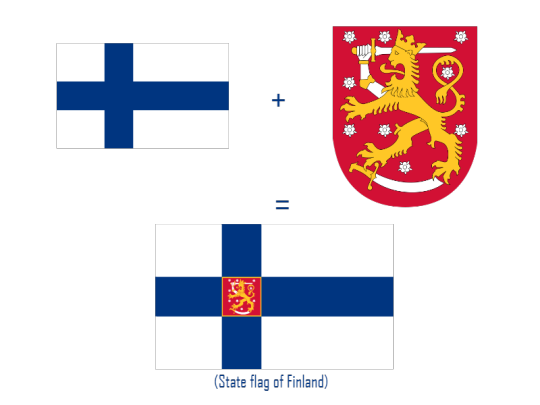
...day: 6th of December, our Independence day.
...epic: Kalevala, published in 1835, made by Elias Lönnrot, who collected old poems and songs from Karjala (Karelia) and compiled them into one book. Kalevala has inspired many artists in Finland and abroad, one example being J.R.R. Tolkien. Kalevala has been translated into 61 languages, so you can probably give it a read if you’d like. (source)
...instrument: Kantele. (source)
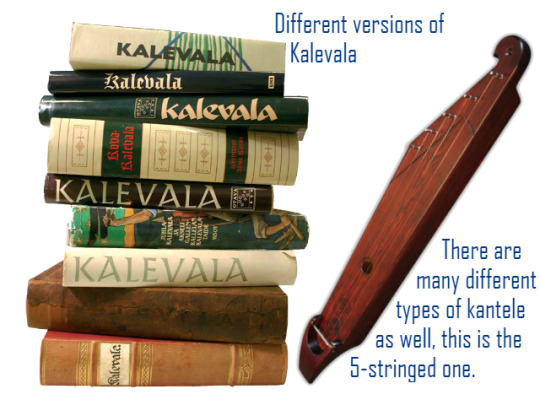
...personification: Suomi-neito, the Finnish Maiden. Yes, we have an official personification as well.
...animal: A bear. It was a holy animal in Finnish paganism, so much so that it was forbidden to say its name out loud. To this day, we don’t know what the real, original word for bear in Finnish was. It had a lot of names that were used instead. The word we use today, karhu, comes from the word “karhea”, which means like, rough? It’s because of the texture of the bear’s fur. (source)
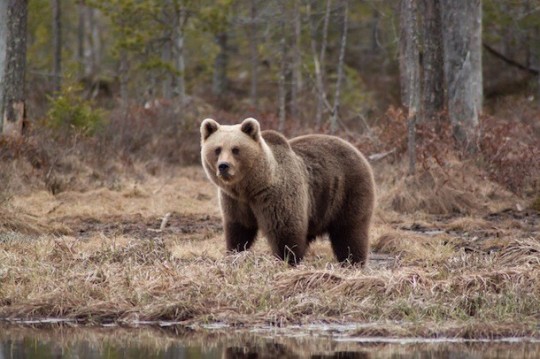
...fish: Ahven, European perch. Beautiful, isn’t it? (source)
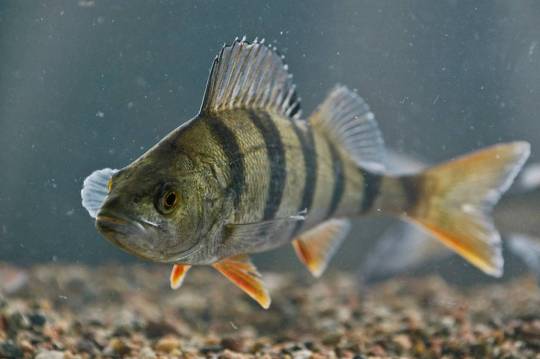
....bird: Laulujoutsen, which is by the way a much prettier name than whooper swan (sorry English). Laulujoutsen literally means “song swan”. (source)
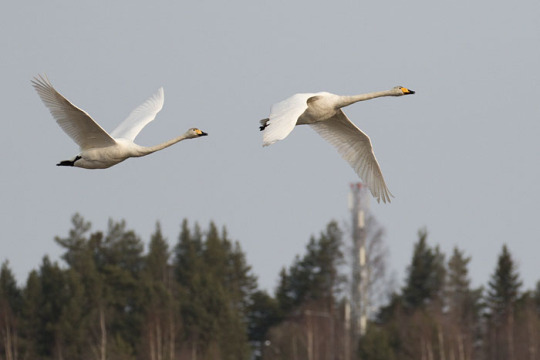
...bug: Leppäkerttu, a ladybug. Funny thing, you know how it’s called like a God’s cow in some languages? Well, the Finnish name, leppäkerttu OR the more specific species seitsenpistepirkko, are literally translated as “alder-Kerttu” and “seven-dotted- Pirkko”, Kerttu and Pirkko being Finnish names for women. What a weird name. ALSO, one of the gods pagan Finns worshipped was called Ukko, and it is commonly believed that he was the highest of all the Finnish gods. A ladybug, back then, was called ukonlehmä. You know what that means? Ukko’s cow. (source)
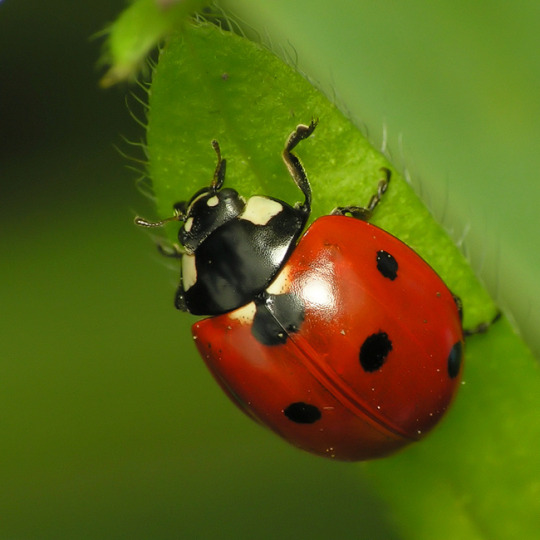
...horse: Suomenhevonen, Finnhorse, literally “horse of Finland”. It was, for a long time, the only horse breed in Finland. It’s apparently considered one of the fastest and most versatile coldblood breeds in the world. During WWII, the Finnish army did not have many cars, so suomenhevoset were very important back then. 7 200 horses died or went missing during the Winter War, and the horses that did survive had their minds as broken as the men they’d stayed beside. There are quite a few memorials for the horses, after all, they helped to carry the wounded when no other vehicle could. We owe them a lot.
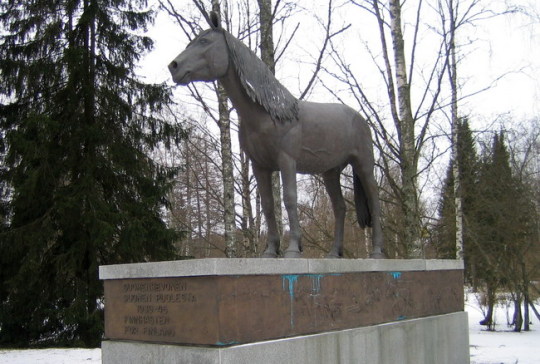
This is one of those memorials. It’s called Suomenhevonen - Sotahevonen, which means basically “the Finnhorse - a war horse”. (no relation to the movie)
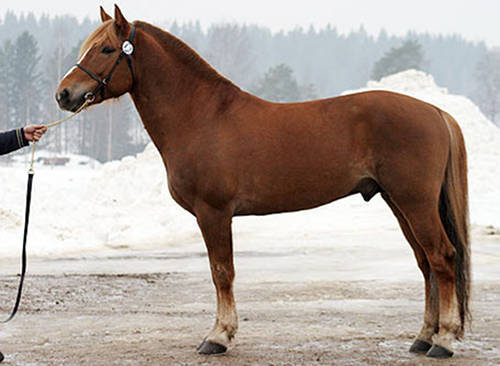
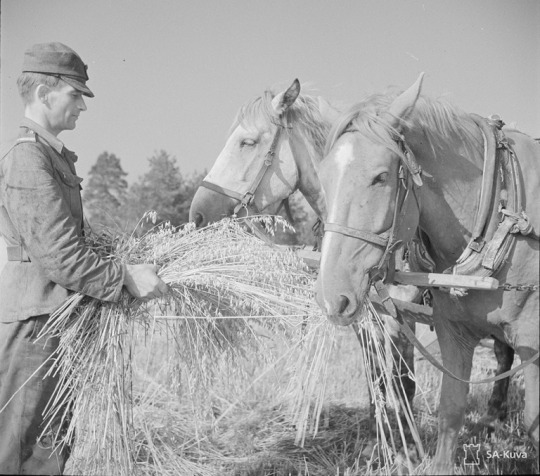
....dog: Suomenpystykorva, the Finnish Spitz, yes, we did need our national dog, who doesn’t??? Written mentions of a barking hunting dogs with red fur have survived from the end of the 19th century, but dogs very closely resembling the breed have been used for hunting in Finland for hundreds of years. (source)
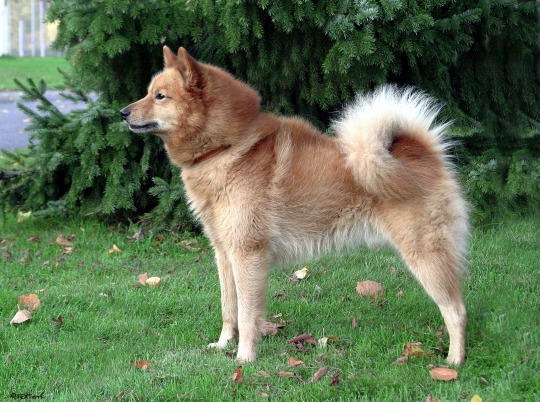
...tree: Rauduskoivu, silver birch. (picture by me)
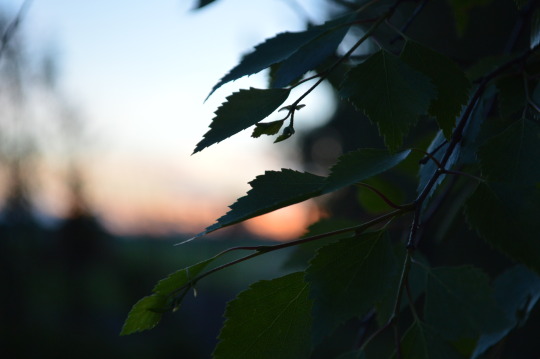
...flower: Kielo, Lily of the valley. (source)
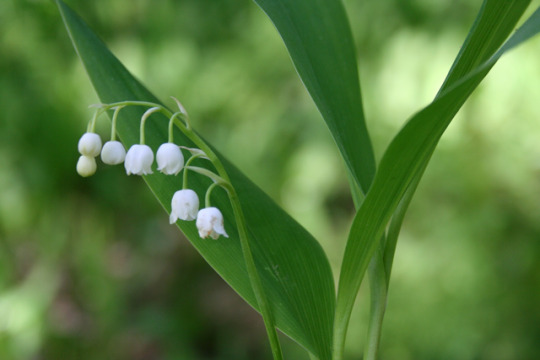
...stone: Graniitti, granite. It’s the most common type of stone in Finland, and it’s been mined here even to be exported. For example, the pillars of Saint Isaac’s Cathedral in St. Petersburg were made of Finnish granite. And, of course, so was Finland’s Parliament House in Helsinki. There’s even a type of granite that has a Finnish name, rapakivi granite.

...poet: Johan Ludwig Runeberg (1804-1877). The words of our national anthem were made by him, and he wrote a collection of poems, called Vänrikki Stoolin tarinat, The Tales of Ensign Stål, an epic poem about the Finnish War of 1808-1809, a work of literature second to only Kalevala. He was already considered a great man (suurmies) before his death, and Runebergin päivä, Runeberg day, is celebrated on February 5th.
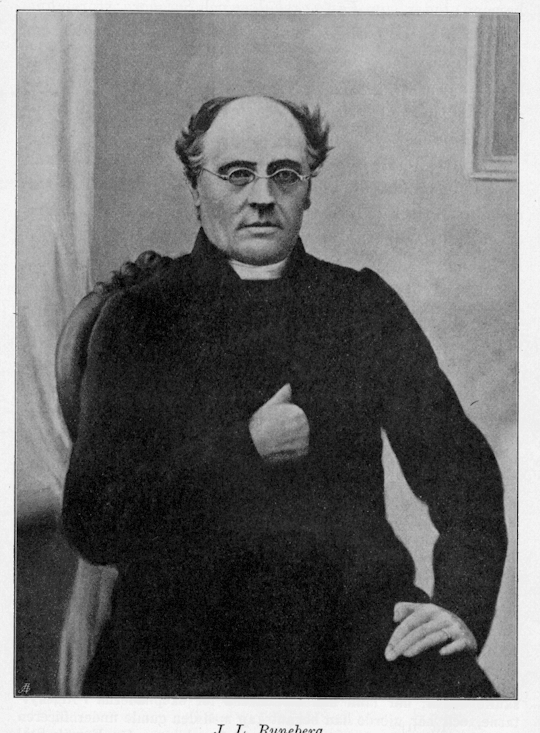
...composer: Jean Sibelius (1865-1957). Composed such little pieces as Finlandia (which was once suggested as the anthem for the whole world), the Karelia Suite, his seven symphonies, Valse triste, and many more. Finlandia is perhaps the best known out of all of them, especially the Finlandia Hymn. It is very beautiful, I agree. Here’s a link, go have a listen if you have time.
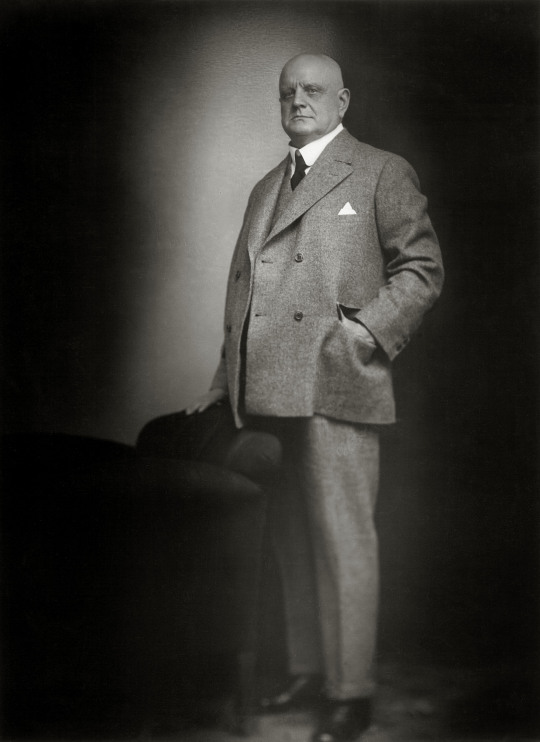
...author: Aleksis Kivi. He was the first professional Finnish author. He is the best known for his novel Seitsemän veljestä, Seven Brothers. He also wrote plays and poetry. Oh, yes, I should probably mention that this first professional Finnish author lived in 1834-1872. No, we haven’t been writing books here for very long. There are no photos of him, but there’s this drawing by Albert Edelfelt.
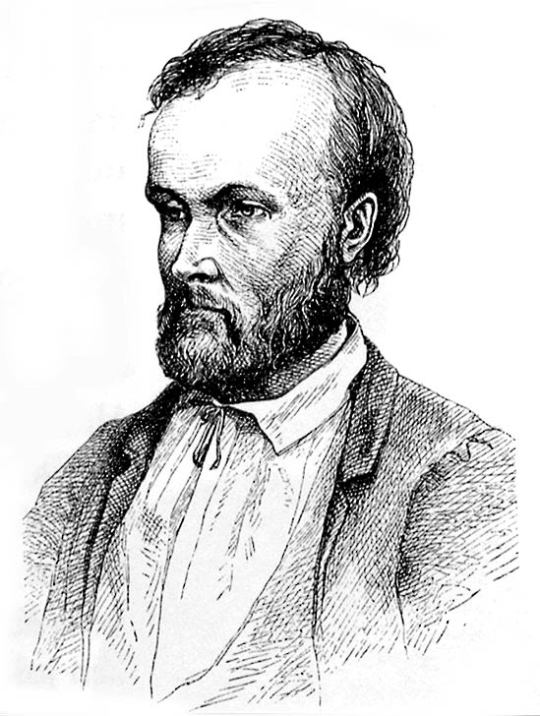
...saint: Piispa Henrik, or Henry, Bishop of Finland. He was murdered here in 1156. Maybe. He might’ve not existed, no one knows for sure.
...satu: See, the word “satu” technically means a fairytale, but some stories that are called a satu in Finnish don’t actually have that much magic stuff, you know? For example this one, that I swear I saw being called Finland’s national “fairytale”, but if it’s not, that’s fine, because it’s still a very well known tale in Finland. It’s called Koivu ja tähti, which means the Birch and the Star. It’s about two children, who were taken from their parents and from their home to Russia during the Russian occupation of Finland called “Isoviha”, or the Great Hatred. A lot of people died, okay, I’ll talk about it later in the history post. Anyway, the siblings, a boy and a girl, who want to return back home to Finland. However, the only thing they remember of their home is the big birch tree growing outside, and how a star always shone through the branches in the evening. They start making their way home, with only two birds leading their way, and after a year find their home and their parents, still alive. However, their two sisters had died while they were away, so the children realize that the two birds were actually the souls of their siblings leading them back home. This was based on the story of the author’s, Sakari Topelius’, great-grandfather Kristoffer Toppelius’ life, as he was taken to Russia as a slave, but after escaping and following the sunset he eventually found his way to Southern Finland.
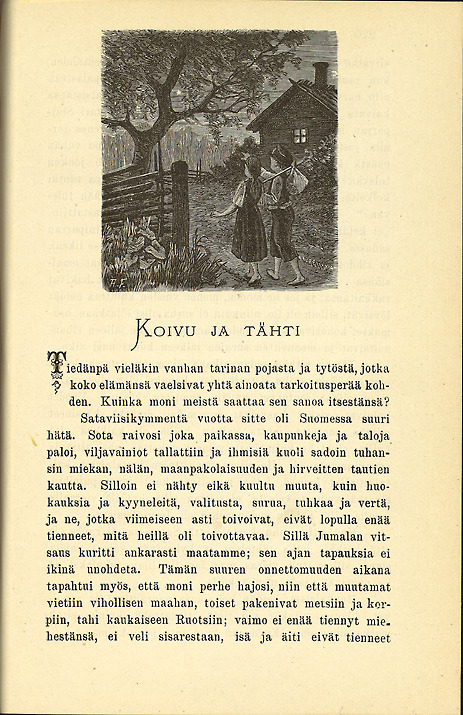
But yeah, that’s about it. In our brand new series (that I came up with while making this post), “Some basic stuff about Finland”, the next part will be about the years Finland was a part of Sweden! Material for tons of fanfics y’all
I hope you enjoyed the read! Sorry that it took so long!
#hetaliafandomdirectory#aph ambassador#aph finland#finland#hetalia#and if you think my posts are too long pls tell me#the amount of times i typo'd the word Finland while making this and the history parts is too big#kinda like when i made my essay on the russification of finland in 8th grade#though then it was with the Finnish names and like both Finland and Russia and i think Sweden a few times???#i really can't write#sorry if this has many mistakes it's nearing 2 am now and i am quite tired so i'll fix the mistaks in the morning#i would've gotten this out sooner but i spent the afternoon making karelian pies with my cousin and grandma#hohoo#it was fun#sorry for the rambling btw#but i do hope you like this!!!#I spent a lot of time on it#i know which posts ill do next btw#answer a couple of asks and make a couple of my own posts#the hardest part is writing because i keep getting distracted by research
135 notes
·
View notes
Text



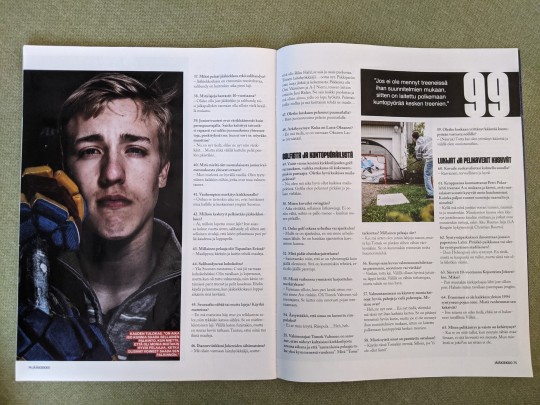
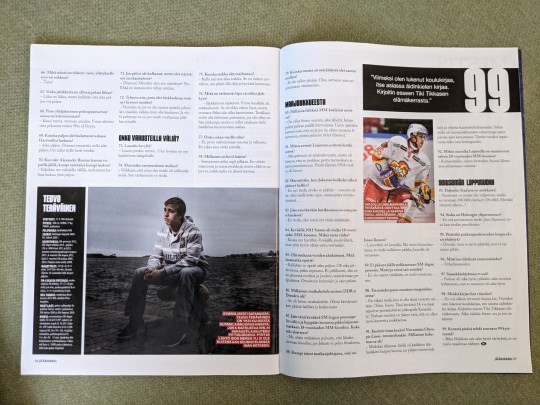
I went thru my folder with old hockey magazines I had saved from around 2011 to 2015 and came across this one and thought it could be a fun to make a post about now in hindsight.
This is Jääkiekko magazine from May 2012, they always have a section of "99 questions with ..." and in this issue they interviewed Teräväinen.
I’ve translated the questions I found interesting under the cut! It ended up being about half of the interview. (*) are my additions.
On the cover "seuraava superjokeri" means the next super joker, he played for Helsingin Jokerit so it's a word play from that. Under, on the blue print it says: "The 17-year-old forward will become a first round draft pick in the summer. The natural goal scorer can dominate in SM-Liiga as soon as next season."
In the 2nd photo the headline and lead paragraph goes:
"A post with dents* - A year ago Teuvo Teräväinen was known only within a small number of hockey insiders. Few passers-by recognize him now either but after a flashy rookie season the Jokerit sensation is on the radar of every NHL team and is a strong contender to become a first round draft pick. Next season with Jokerit the talented second line center will be one of the main talking points in the SM-Liiga."
(*references the net Teräväinen had in his backyard and into which he practiced his shooting)
3. You've been described as a magician, top scorer, wunderkind and a prodigy. What do you think of these descriptions?
TT: Heh, those are some descriptions yeah. What can I really say? Don't really wanna comment on them much.
4. How nervous are you about the Draft?
TT: I try not to be nervous as best as I can. In a way I don't have anything to be nervous about since I don't care which team picks me or at what number I go.
6. Which is stressing you more, English interviews or physical tests?
TT: Maybe both. Bench press (laughs) and English interviews can be tough.
12. How far along have you planned your career with, for example, your parents or your agent?
TT: Haven't really planned things with others but I've thought about them myself. I try to go step by step and not jump too far ahead.
14. How does it feel to be so young with all the star players in Jokerit?
TT: How to say it? I haven't felt like I was young but a part of the team instead. The team's been very good with me and they haven't been looking down at me like: "oh he's young". It's been fun to play in an experienced team.
15. Is there a generational gap between players?
TT: You can see the age difference, older players look older but we're all childish, at least with our topics.
17. What does a 17-year-old do in the sauna nights of the team?
TT: I actually haven't been in any yet. I've always been at national team's camps or something.
19. Did you get the number you wanted?
TT: I did, yeah. I could've taken #18 but Semir (Ben-Amor) has it. But i'm happy with #86, it's good.
23. What are your strengths as a player?
TT: Offensive play and with that playing with the puck, passing, IQ, power play and skill, just the usual skill - skill with hands.
24. And weaknesses?
TT: They are to do with defensive play, strength and physicality. Battles and such but I think I took a step forward last season. That's a good thing.
25. Have you ever been "pressed into a mold" or has your playing style gotten to develop naturally?
TT: As a kid the play was mostly offensive/attacking, I didn't have to think about playing defence. Up until 15 years old, I got to attack pretty freely. Playing defence became more important when I started to play in A-juniors a couple seasons ago.
26. On a scale from 1 to 10 how determined are you?
TT: Maybe 8, feels like an 8.
32. What kind of role are you planning to take with Jokerit next season?
TT: I think a pretty big one. I try to be a top player and not just take others' example but give others example myself too. So that someone in the team can take something out of the way I do things on the ice and off the ice.
35. If you could pick anyone, who would be your car driver?
TT: Nico Manelius for sure. He's been my driver this season. I've had others too, like Riku Hahl but he's not nearly at the same level. Nico’s clearly the best.
36. What are the most important qualifications to be a good driver?
TT: The car is obviously important. Hahl's car is totally awful, he takes a lot of heat for it from the guys too. I wouldn't dare driving with him. Manelius is a steady performer, never lets you down.
38. What sports did you play as a 10-year-old?
TT: Hockey and floorball, probably football (soccer) during the summers at the time too.
42. When did you decide to focus only on hockey?
TT: So when I stopped playing other sports? Three years ago, before that floorball was kind of a side thing, I played a couple of games in the regular season and playoffs.
45. Do you follow floorball or other sports? Go to games?
TT: I don't go to games but I like to watch floorball on TV, it's an interesting sport. Sometimes I watch football too but I don't follow it much. Feels like they never score there.
47. Have you ever played with a wooden stick?
TT: As a kid I did play with a wooden stick.
49. You won the hockey players' golf tournament last summer even though there were more experienced players too. Are you good with all stick games?
TT: Well, I've been pretty good in all of them. I've played golf for a long time and still play it.
50. How is your swing?
TT: Pretty bold, kind of a hockey swing. I don't really care where the ball goes - as long as it goes far.
52. What do you think of off-ice training?
TT: Let's just say it's more stupid than being on the ice but you still gotta do it to be better on the ice.
56. Which word describes your professional relationship (with his coach, Tomek Valtonen), tranquil or colorful?
TT: Colorful of course. At times we're joking around, other times it's more serious but the relationship is really good.
57. Coaching you has been described in many words: good, bad, worse. What are they?
TT: Heh, well... I won't tell them here. He (Tomek) keeps the discipline during practices but sometimes when things haven't gone to a plan I've had to jump on an exercise bike in the middle of a practice.
58. What have been the reasons?
TT: I'll quote Tomek: "when I haven't been present".
59. Have you ever tried to turn the resistance of the bike to zero?
TT: (Laughs) Of course I have and sometimes I've even succeeded.
60. Describe your diet in three words?
TT: Greasy, healthy and good!
64. Your first name is not common for people your age. How did your parents come up with it?
TT: I actually don't even know. Maybe they didn't want a usual Ville*....
(*very common name for men of all ages in Finland)
66. Which of these is the most important: skill, unexpectedness or courage?
TT: Skill!
68. Your longest video game stint?
TT: Six hours, at least. I've played a lot of War of Duty lately.
72. The dumbest thing that has made you upset in hockey?
TT: Probably if I didn't get an assist on a goal even though I should have. Or even worse is if I score and they mark it down for someone else.
79. Have you had any concussions?
TT: I haven't had any, I've managed to always dodge them.*
(*ouch, tho it's good the recent one is his only as far as i remember)
84. In 2011 Team Finland finished in the 5th place at the U-18 tournament. Why only as 5th?
TT: Because we lost to Team Russia in the quarter final, just as well we could have won that game too.
89. You didn't get to be on the ice to accept the SM-Liiga bronze medal (because of the U-18's). When and where did you get it?
TT: I actually still haven't received it, I don't know where it is.
93. What is the population of Helsinki?
TT: There's like 5 million people in Finland so maybe around 500k in Helsinki? (to be exact 596k) Did i really get it right...?
94. Who's the mayor of Helsinki?
TT: I don't know, I barely know the president.
95. Do you think the municipalities in the capital city area should merge?
TT: Luckily I don't have to decide but they probably shouldn't.
96. What do you check first in the news paper?
TT: The sports section.
97. Your favorite tv show?
TT: Putous* was pretty good, I liked a lot of the characters. The grandma was pretty good.
(*Finnish live improvisation comedy/sketch show (there are still new seasons, the latest just finished). Every actor comes up with a humor character with a catchy phrase and one of them wins. "The grandma" is Marja Tyrni and I just got such flashbacks from typing this sentence.)
98. Last book you read?
TT: I don't read many books. The last book was a study book, a Finnish book. I wrote an essay on Tiki (Esa) Tikkanen's biography. An eventful book, great career and a lot of chirps.
99. Who should we ask the 99 questions next?
TT: Riku Hahl could have good stories, he's also seen a lot of the world.
#teuvo teräväinen#teuvo teravainen#carolina hurricanes#canes#hockey#nhl#mp#i knew i had this mag but i thought it was from 2014 and post draft#i really didn't rmbr i've been following turbo for this many years???#good on 16yo me for spending 8 euros on this tho that was excellent thinking
85 notes
·
View notes
Text
Mmm yes a story
(I finally just decided to put the whole story even though I'm not done yet- oh well here goes nothing. Get ready to read through 5 google doc pages-)
Russia and Finland were arguing. Again. RusFin sighed quietly and walked out of the room. She looked around the house and found her favorite teddy bear was on top of a tall cabinet. She climbed onto it and managed to grab her teddy. She suddenly slipped and fell but she didn’t feel like she hit the floor, she had been caught by someone.. The cabinet was being held by the person, too. He looked at her. “Are you okay, child?” She recognized his face but had forgotten his name.
She looked around and spotted a picture of her mom when she was younger. She had the same symbol on her face as this man did. The picture had been ripped but she knew who he was. He put the cabinet back in its place and turned to look at the picture. He chuckled. “She kept it, after all… She just ripped me out of there..” He hummed. “Where are your parents, dear? Well, I’m assuming they’re your parents since your flag looks similar to my daughter’s..” She looked at him and pointed upstairs, where there was still loud shouting. He picked her up again and walked upstairs with her. He opened the door to the room and inhaled quietly, then shouted louder than both Russia and Finland. “QUIET DOWN, BOTH OF YOU!” They both turned to look at him in shock. Russia froze and looked pale. Finland looked shocked and confused. Russia walked backwards and Soviet smiled. “What’s wrong, sweetheart? Didn’t you miss your father?” She shook. “H-How a-are..” She felt light-headed and passed out. Finland caught her, laid her on the bed and turned to glare at Soviet. “How are you still alive..”
He glared back at him. “You know, I never liked you. I still don’t, so why should I answer?” Finland growled and looked at RusFin, then back at Soviet. “Let her go.” Soviet chuckled. “She’s my granddaughter, isn’t she? I hadn’t seen her before, let me at least have a small moment..” Finland walked towards him and looked at his daughter smiling. “Sweetie, can you go to your room..?” RusFin nodded and Soviet put her down. He was about to follow her but Finland grabbed him by the arm. “I don’t think so. It’s not happening, not again. And not my daughter.”
Soviet’s glare intensified and he snarled at Fin. “I wouldn’t do that, not to her. Russia was a brat, she deserved it. There’s a difference…” Finland finally snapped and raised his hand, striking the USSR across the face. He chuckled. His eye started to glow yellow and he slammed Fin against the wall. They began to fight. Soviet pinned Finland against the wall again and held him there. He took out a knife and made a cut on Fin’s arm, then took out a small bottle and emptied a small drop of a yellow liquid into it. Finland screamed and Russia watched horrified as she’d woken up a few minutes before. Finland collapsed, his flag changing to a new one. His eyes turned to a golden color and Soviet smiled, turning to stare at Russia. She was shaking. He walked towards her and she backed away. He put a hand on her shoulder and looked into her eyes, seeing her fear. He smiled. “I’ll extend your suffering just a liiiiiittle longer, dear~”
He grabbed her by the arm and she shouted. “GET YOUR HANDS AWAY FROM ME! YOU’VE DONE JUST ABOUT ENOUGH IN MY LIFE!!” He smirked. “Well, you’re a little annoying, aren’t you..?” RusFin was standing in the doorway and began to cry. Soviet turned around and sighed irritated but let go of Russia’s arm. He walked towards his granddaughter and hugged her. She pushed him away and ran to her mom, hugging her instead. He seemed even more annoyed at this. He loomed over both of them and snarled. “Finland has been fixed. I didn’t want to do this, but it appears I must do it to gain your obedience, Russia.” Russia hugged RusFin protectively.
Finland walked up behind Soviet and growled, tackling him. Soviet threw him down and hissed at him. They started fighting again, but Finland had been weakened by the drop Soviet put in his arm. Russia took the chance and ran out holding her daughter. Finland was overpowered and knocked out and Soviet pulled Russia back into the room by the hair. She let go of RusFin and screamed. “RUN!! Don’t look back, Mama’ll be fine...” The door was slammed shut and there was pain-filled screaming. RusFin cried but ran downstairs and hid. The screaming stopped after a while and the door opened.
Soviet walked downstairs. He called out her name several times and she heard him slamming doors open. He sighed, irritated again. “Darling, if you don’t get out of wherever you’re hiding I’m afraid I’ll have to make your punishment worse.” She kept hearing his heavy footsteps around the house. He spoke loud enough for her to hear clearly. “You’re really making me angry, RusFin. I don’t think you want to see me angry, now do you?” There was quiet mumbling from upstairs. A few minutes later, Russia and Finland walked downstairs. Their arms were bandaged and they looked normal enough. They weren’t themselves, though. Their flags had changed to new Soviet flags.
RusFin held her breath and Russia sighed annoyed. Finland huffed. “You stubborn woman.” Soviet chuckled. “What’s wrong? Fighting again? Ah, and I thought you wouldn’t fight anymore.” Finland glared at Russia and she glared right back. Their eyes weren’t normal anymore, they’d changed to a golden color. Soviet said something in Russian and both Russia and Finland’s eyes turned completely golden. They turned to look at him. He smirked. “So, it did work.. Anyways. Both of you, go look for RusFin and once you find her, bring her to me.” They nodded and began to search. RusFin felt tears sting at her eyes from fear and she curled up in her hiding spot. Soviet continued to search. Once they were all away from her, she carefully snuck out of the spot and quietly walked towards the door to the outside. She heard shuffling footsteps and gasped as she turned around and saw Finland. He stared at her for a few seconds and then walked towards her.
His eyes glitched and the yellow color disappeared. She whimpered quietly and he kneeled down to her height. He looked around and whispered. “Run while you still can. Get out of here, your mother and I will be ok.. We’ll take care of this situation. I promise.” She hugged him and he got up again. She quietly opened the door and got outside. She hid outside and heard Finland say something. “Sir, I can’t find her.” Russia nodded. “Me neither.” Soviet growled. “You useless pair of idiots.” They both looked away. He sighed and suddenly froze, staring at Finland.
“...You let her go, didn’t you?” Fin looked at Soviet. “W-What do you-” Soviet grasped Finland’s arm and squeezed it hard. Finland squirmed in pain. Soviet yelled in his face. “YOU LET HER GO, DIDN’T YOU!?” Finland shouted. “No!!” Soviet threw Finland down and chuckled, very displeased. “Your eyes.. they gave you away, idiot.” He laughed, his dark and low laugh echoing through the house. Russia went back to her normal state and looked at them. “What happened-?” Soviet was holding on to Finland’s arm, slowly crushing it again. Finland was screaming aggressively, cursing in Finnish. “HÄNEN IT-LEVY, MENHETÄ!” Russia screamed at Soviet too. “PAPA OTPUSTITE YEGO!!” Soviet turned to look at Russia and got up to his full height, passing Russia by a fair length. He looked down at her, his eyes glowing in a scary way. “Who are you..” He grabbed her by the hair. “..TO SPEAK TO ME THAT WAY!?” He slapped her across the face and threw her down.
Finland got up, holding his arm in pain. Soviet kneeled in front of Russ and glared at her. “Speak like that to me again. I dare you.” She went silent and held her cheek. “I-I’m sorry..” He got up and snarled at her. “Dumb brat.” She silently got up and mumbled something then walked upstairs to her room again. Finland was about to follow her, but Soviet held him back. “From now on, I expect you to stay away from her unless you want to suffer more. She’s off-limits to you.” Finland pushed him away. “But she’s my-” Soviet shut him up. “I don’t care what she is to you, you’re not going near her as long as I’m nearby. Oh, and trust me. I’m going to be nearby as much as possible..” Finland just stared at Soviet, holding his breath. Soviet bared his teeth and then walked away.
A few years later..
Soviet shouted. “Russia, get over here!!” She rushed to him. “Yes, Father?” Soviet sighed and gave her a paper. “Go give this to Mexico and tell her to fix it, quickly.” Russia nodded and walked away. Finland walked to Soviet. “Sir, the riots in Australia have been stopped.. A lot of people were injured or died, though..” Soviet smiled. “Good. Don’t worry about the deaths, they’re simply sacrifices for the new Empire. Nobody cares about a few people dead.” Finland’s eyes dulled and he sighed. Soviet looked at him. “That reminds me, have our volunteers found her yet?” Finland shook his head. “N-No sir, they haven’t..” Soviet growled quietly and slammed his fists on the table in front of him.
“Tell China to send more people to ask the other countries. If they don’t comply, invade them. We need to find RusFin at whatever cost. The rest of those damned capitalist countries keep hiding or helping her. The more she grows, the less chance I’ll have to take her land..” Finland felt his blood boil with rage as Soviet said that. He knew he couldn’t do anything, but he wished he could. Mexico and Russia walked to Soviet. Mexico cleared her throat. “Señor, es posible que hayamos encontrado a RusFin y sepamos con quién está.” Russia looked down. “She says they might’ve found RusFin and whoever she’s with..” Finland harshly took in air and coughed. Soviet, Russia and Mexico looked at each other and then at him. He looked back at them. “Ah, sorry- choked on air.. What?-” Russ looked away and hid a smile. “Nothing.” Mexico mumbled. “Awkward..~”
Soviet looked at both of the ladies and sighed. “Jeez. Ok. Tell Germany and China to take back their volunteers and send them to her location.” Russia and Mexico nodded and walked out of the room. He turned to Finland. “You, continue to train the other countries for war with the Capitalist’s helpers. We have his sisters, so he must give in soon. This will be the last piece to get him to fall.” Finland nodded as well and left the room. Soviet laughed to himself and laid his head on his arms. “It’s all coming together.. I’m finally gonna take over the world, just like I planned to before my death.. He’s cornered now. He’ll have to fall to my new grand empire..”
Meanwhile, with RusFin, she was playfully arguing with Japan. Japan was trapped in Soviet’s empire too, but she usually snuck out of the “dorms”, well, more like prison to her. She snuck out to see RusFin and usually played and spoke with her. Japan booped RusFin’s nose and she giggled. RusFin and Japan were quite attached to each other, since Japan took care of RusFin for a long time before she was annexed. RusFin heard loud footsteps getting closer and she went to hide. Japan turned around and pretended to be looking at the sky. Soviet glared at Japan and she looked at him before bowing. “Konnichiwa, sir. What brings you here?” Soviet got closer to her. “Japan. You know we’ve talked about this. You cannot keep sneaking out of here, it’s dangerous-”
Mexico was flying above them and Germany and China ran there too. China spoke. “Sir, she’s here!” Soviet looked at the 3. “What?” Germany sighed. “She’s here. RusFin. The one you’re looking for.” Soviet looked around. “I don’t-” Mexico swooped down and picked RusFin up, then flew out of the bushes where RusFin had hidden herself. Soviet looked at her and smiled. “Ah, thank you Mexico, Germany and China.” Mex put her on the ground and Soviet snapped his fingers. Germany took out a device and put it on her neck. Soviet chuckled. “Move just one inch further from this area, you’re gonna be in excruciating pain until you get back here.” He turned to look at Japan and lifted her by the collar of her shirt. “So.. you were hiding her this whole time, huh?”
Japan looked nervous. “S-Sir, I-” Soviet threw her at Germany and he caught her. “Take her to the dorms, you know what to do.” Germany looked down at Japan and she began to cry. “Please sir, I’m sorry!” Germany carried her into the dorms. He set her down on her bed and looked at her. “I’m sorry Japan, you know I can’t disobey orders..” He put the same device RusFin had on Japan and left the room. She immediately felt a wave of pain go through her and shouted. Germany flinched outside the room and his face darkened as he walked away.
RusFin was forced into Soviet’s office and he smiled as the door closed. “Listen, child..” RusFin desperately tried to take the collar device off but it wouldn’t budge. She yelled at him. “You’re a psychopath! Let me go now!!” He untied her wrists and took out a remote. She immediately tried to lunge at him but she abruptly stopped and screamed as he turned on the device on her neck. He watched as she fell to the floor and squirmed, trying to take it off. “STOP IT!! TURN IT OFF, PLEASE!!” He turned the device off and stared at her, lying on the floor, breathing heavily.
#countryhumans#countryhumans rusfin#countryhumans japan#countryhumans germany#countryhumans russia#stories#fiction#Soviet!AU#countryhumans china#countryhumans mexico#countryhumans ussr#countryhumans soviet union
8 notes
·
View notes
Text
Fave 2021 national finals songs
Since I don't have anything better to do with my life at the moment I decided to ramble about stuff. Okay, here are my thoughts about my fave songs from the national finals of 2021, in no particular order!
Norsk Melodi Grand Prix
• Monument was my absolute favourite and I still can't believe to this day that it didn't win :( Keiino are fking fantastic and they killed the stage (though I kind of preffered the black outfits from the 1st heat over the final ones, they suited the song's athmosphere better). I cried real tears when I saw they lost, for real. Heartbreak 💔
• Hero was such a nice throwback to 80s music style, the staging was also really neat. Would love to see Raylee come back next year in the selection, she has a cool stage presence
• Okay but Vi er Norge was a banger and I'm still listening to this one, a real shame it didn't even qualify nor win the 2nd chance round. As you already knew before, I have a weakness for violins because yes. The performance was so energetic and fun, should have def qualified. Underrated.
• Ut av mørket/Fallen angel was really good too. I wanted it to be kept in norwegian for esc but oh well. The stage show was just a tad messy but memorable.
• I can't escape was something I'd hear from Roxen ngl, the style matches her perfectly, even her cursive singing, everything. Either way I loved this one too, this song feels like a hug.
• Pages was so magical, I'm glad we got another joik song, sadly this didn't qualify 😥
• World on fire was kind of generic but puts me in a good mood everytime I listen to it, it's really catchy.
• Let loose is so g r o o v y and cool, it was my fave from the 1st heat when I got to listen to the songs. I'm lowkey happy it advanced to the final instead of Elevate, I'm sorry but I saw everyone praising that one in youtube comments, I never saw the hype, it was too regular and plain for me.
• Own yourself was so cute and funky, loved how it showed her ethnic background a lil with that disco sound.
• Witch woods...ehhh...While it's funny and unique, I think it's suited more for a witch Disney musical than Eurovision. But I like it anyway.
• Faith Bloody Faith oh yes I needed a rock song in this nf. Relieved it won the 2nd chance. Oh and I just realized, the superfinalists in mgp were literally the ones from the 1st heat. Crazy huh?
• Nordlyset is something I'd listen to near a fireplace with a cup of hot chocolate in hands watching the snow fall in my cottage located in a forest far away from civillization. So soothing and beautiful <3
• Eyes wide open was epic just like his 2020 viking schlager song (i prefer his 2020 song over this one but that's another story)
Melodifestivalen
• Little tot was amazing but def not as good as Bulletproof. It's still catchy asf and one of my favs from this selection.
• Dandi Dansa aka a banger, again another catchy song.
• Every minute sounds like a summer hit, it's awesome. It's also the spawner of all those haha eric on a kitchen tile memes I've seen around during that time.
• The world and especially Sweden wasn't ready for the masterpiece called Rena Rama Ding Dong. They should tone down their preference for safe pop songs and choose meme worthy songs like this one in the future tbh. They didn't even qualify, Sweden = coward.
• One Touch is a fun club track, I can see this as a summer hit as well. But her stage show...go girl give us nothing
• In the middle, once again The Mamas delivered.
• And finally Voices, which its nf staging was superior to the esc one. We are so sorry Tusse 😔
Festivali i Këngës
• Zjarri Im a total banger, it wasn't even in the top 5 ffs Era Rusi queen.
• Njësoj has such a nice party vibe, should have qualified.
• Haven't paid any attention to Karma until it won, then I said hey this isn't so bad, it's traditional and ethnic, I can actually see Albania in the final with this.
Dora
• Rijeka was the only one I thought it will win by a landslide and I was surprised it didn't. The staging was a bit too over the top, though
• Tick Tock grew on me after it won and quickly became one of my faves of this year's esc. I'm still sad it didn't qualify 😔
• She's like a dream is super uplifting and also sounds like an 80s song.
• Colors is something I heard a million times before but for some reason I'm jamming to this? Also I heard she's blind, is it true?
Eesti Laul
• Took me a while to have a fave from this nf but after some listens Magus Melanhoolia stole my heart 🧡 it's so different from the others and the staging looked so proffesional.
• Lost in a dance had me d a n c i n, I noticed we had a lot of 80s throwbacks in this nf season, this included. The live was so dissapointing though 😔
• Not so keen on 6 at first but now I absolutely love it, she has such a nice style and the song's athmosphere is so magical.
• Time was amazing, surprised it came 2nd!
• I actually liked The lucky one lmao, I found it much better than his previous entry.
• Heaven's not that far tonight was the party 80s bop we didn't knew we needed
Dansk Melodi Grand Prix
• Probably my biggest letdown of this nf season but I actually managed to like Står lige her, digging the electro 80s (again) sound
• I also liked Øve os på hinanden as well, this one really feels like a legit 80s track rather than a throwback.
• Silver Bullet was interesting as well, it was the early frontrunner when the songs first came out from what I remember.
Uuden Musiikin Kilpailu
• I love you is so wacky and catchy, and in finnish! I'd hear this as a soundtrack in an old video game.
• Dark Side was the definite winner ever since I heard it, and they even got a top 10 finish for Finland for the first time in years! Couldn't be more proud 😭
• Hurt was also one of my favs, Aksel needs to come back to esc, maybe in 2022 methinks 🤔
• Wait what is Laura Põldvere, an estonian singer tm doing in finnish nf? While I liked Play, I knew it wasn't strong enough to win, and she even came last. Do you get any flashbacks from another estonian entry with the same name that came last? 👀
C'est vous qui decidez
• Voila was the clear winner and that's about it, she deserved the win, it's just too beautiful for this world 😭
• Alleluia was an interesting sound of afrobeat, too bad their chances were killed because of messy staging :(
• Amour fou was so catchy and I loved the horse head thing lmao
Pabandom iš naujo
• Discoteque all day any day. The Roop world domination 💛
• Where'd you wanna go is so calming. I listen to this when I'm stressed and it works wonders, this was really beautiful.
• Open is so unique and soothing, a total contrast from her 2014 entry.
• Never fall for you again is a total earworm, even now as I'm writing this...even if I haven't listened to it since February.
Sanremo
• Zitti e Buoni was my instant fave, it simply stood out from the others by a lot.
Festival da Canção
• Por um triz is a beautiful ballad, was my fave.
• Saudade was the early favourite, reminds me of Telemoveis with its weird but artsy style.
Israel NF
• ...I really only liked Set me free tbh.
• La la love had a good potential but I can't not cringe at the corona reference like...ugh. Such a fun party song killed by one lyric, such a shame.
Russia's NF
• Just Russian Woman was the only one who deserved to win.
Spain's NF
• Yeah, they were both good but I liked Voy a Quedarme more.
3 notes
·
View notes
Note
♪
the source
though i’ll do even better and link the songs in question
a lot of these are gonna be nightwish fight me
alright. so in addition to my love of metal, i also really like orchestral, instrumental music, and this song uses both absolutely wonderfully.
lappi (nightwish)
it’s very old, from their first album, angels fall first, originally released back in 1997. and yes, it is almost 9.5 minutes long. but honestly even now i think it’s one of nightwish’s most beautiful songs. it’s pretty much just a love anthem to Lapland, which is the northernmost region of Finland (where the band is from).
the song is divided into four parts. the first is called Erämaajärvi, which translates to “wilderness lake,” and it’s sung entirely in finnish, and it’s basically talking about the general experience of Lake Ikijärvi, which is actually a lake in technically Russia but that’s a whole other topic of why it has a finnish name and that’s not what we’re talking about here.
the second part is called witchdrums, and it’s entirely instrumental. it’s absolutely beautiful.
the third is this moment is eternity, and that part of the song is in english. and basically it’s another description of the wilderness and how cold and beautiful it is.
the final part is called Etiäinen, which translates to “ethical,” and there are no words; it’s just instrument and vocalization.
the whole song is just beautiful. a lot of people, when asked about what is a good song to start off listening to nightwish with, say ghost love score. which is also a really good one, but i think lappi is very much underappreciated, primarily because of how old it is. tuomas holopainen, the keyboardist of the band, also writes a good portion of the songs (there are only a few which he didn’t primarily write himself), and his talent with songwriting even manages to show itself this early in the band’s career.
idk yo i just love it a lot
2 notes
·
View notes
Text
Syttende Mai: Swedish-Norwegian War of 1814. Norwegian nationalism and the establishment of Sweden’s current royal house.
Europe in 1814-1815 is a flurry political activity. The War of the Sixth Coalition has supposedly finally defeated Napoleonic France in the spring of 1814. That autumn in Vienna, Austria the major anti-French powers, Britain, Austria, Prussia and Russia and the anti-republican/anti-Bonapartist restored Bourbon dynasty of France are attempting to dictate terms for the outlook of Europe’s map. The conservativism of the monarchs from each of these countries sees republicanism and national revolution as the very tenets of ideology that had undid Europe’s delicate balance of power since the French Revolution of 1789. Austrian Foreign Minister and later Chancellor Klemens Von Metternich is the “maestro” for the so called Concert for Europe or Congress of Vienna is leading the charge, hoping to create system whereby the great powers of Europe will consult each other in an early form of shuttle diplomacy to suppress massive changes to Europe’s map. For the immediate several decades of the 19th century following Napoleon’s defeat this so called “Metternich System” to varying degrees will work in suppressing nationalist and revolutionary sentiment. Increasingly this will be difficult to maintain as romantic nationalism and republicanism have been planted as seeds in the collective psyche of Europe’s many peoples. The Congress of Vienna includes the Big Five (Britain, Austria, Prussia, Russia & Bourbon France) but it also includes Spain, Portugal, Netherlands, various smaller German and Italian states and the Scandinavian powers of Denmark and Sweden. These latter two nations would have their own roles in the Napoleonic Age and in 1814 romantic nationalism within the third Scandinavian nation, Norway, would give birth briefly to a new nation caught in the dynastic struggles between Denmark and Sweden.
Over the course of Scandinavian history the modern nations of Norway, Denmark and Sweden went through many changes from small petty kingdoms born out of the Viking Age to more unified but separate countries and then countries united under the singular banner of the Kalmar Union (1397-1523). By the 18th and 19th centuries though they were divided between the Kingdom of Denmark-Norway in personal union and the Kingdom of Sweden. All these nations were populated by related Germanic peoples who spoke related languages and had common histories, mythologies and cultures all shared the same official religion of Lutheranism. They were also separated by their own local customs as well and differences in their related languages and somewhat due to historical memory of their overlapping but separate pasts. Geopolitical struggle also wrapped up Scandinavia. In the 17th century Sweden arose to become a great power in Europe, forging the Swedish Empire which ruled Sweden, Finland, parts of Baltic countries, Poland, Russia and Germany. Meanwhile Denmark-Norway had the role of second-tier or middling power in European politics. Denmark-Norway was in personal union with a single king but Denmark was very much the dominant power in the union with Copenhagen dictating it’s northern partner’s fate. Sweden remained its rival and Norway was their battleground more often than not.
During the 18th century, Sweden’s off and on wars with Poland-Lithuania, Russia, Denmark-Norway and other powers weakened its status. By the Napoleonic era, Sweden like Denmark-Norway was a shadow of its former self. Nevertheless it still retained a strong enough influence to help tip the balance in favor of the French Empire or its opponents. Sweden’s ruling family, the Holstein-Gottorp dynasty from Germany had at its head Gustav IV Adolf. Gustav IV was opposed to French republicanism and to Napoleon and sought an alliance with his country’s traditional enemy, Russia. Against advice from his inner council, Gustav joined the War of the Third Coalition against France in support of Britain, Russia, Austria, Naples & Sicily. During this war, Sweden was a non-entity. France won the war with the victory of Austria and Russia at Austerlitz. During the Prussian lead War of the Fourth Coalition in 1806 Sweden saw its possessions in modern Germany and Poland, known as Swedish Pomerania lost to the French advance which had wiped out the Prussians in under a month and bloodied the Russians as well. During this time, Napoleon’s troops and the nationalist spirit they invoked revived a partial Polish state, the Duchy of Warsaw. The Duchy was seen by Polish nationalists as a first step towards reviving the conquered Polish-Lithuanian Commonwealth which had been partitioned in the 18th century by Prussia, Russia and Austria. The French saw it more or less as a client state and vehicle from which it could support its own army in ventures elsewhere in Europe. The defeat of Russia in 1807 and the Treaty of Tilsit now forced Russia to join Napoleon’s economic blockade of his most steadfast enemy, Britain. It also put Russia at odds with Sweden which remained a British ally.
1808 saw the Finnish War between Sweden and Russia, the Russians overwhelmed Swedish garrisons in Finland proper and then in a daring infantry crossing of the ice frozen waters of the Gulf of Bothnia arrived on the eastern Swedish shores where Sweden was forced to surrender. Finland was lost to the Russians ever after, becoming the new Grand Principality/Duchy of Finland with the Tsar as Grand Duke. Sweden’s fall from the heights of power was never more evident. 1809 Gustav IV was arrested and overthrown in a coup and replaced by his uncle and former regent, who was crowned Charles XIII. Charles XIII was old, suffered from heart attacks and had no suitable heir. His role in governance was minimal and more ceremonial for the presentation of stability. The Swedish parliament, the Riksdag needed to find a new heir. It found it initially in a Danish prince, who Charles XIII adopted as he was named Charles August, however the prince died from a stroke while riding a horse, he was only 41, so the search renewed. The ultimate choice was from an unlikely source, Napoleonic France.
Jean Bernadotte was a Frenchman who came from the middle class once hoping to become an attorney. He had no noble connections but eventually made his way into the army and under the French Revolution where men could be promoted on merit and not have to rely on aristocratic connection Bernadotte became an officer. He fought in numerous campaigns in Germany and Italy in particular and earned praise for valor and inspiring his men. By the time Napoleon came to power in France, Bernadotte eventually became one of eighteen of his Marshals of the Empire, a new form of aristocracy based on Napoleon’s need to control the military and to honor his subordinate men of distinction. Bernadotte was also made Prince of Ponte Corvo for his service in the Battle of Austerlitz. However, he also began to fell afoul of his Emperor’s favor gradually. During the 1806 campaign against Prussia while leading his own French Corps, Bernadotte was ordered to support Marshal Davout’s Corps but due to poor roads failed to commit troops to battle. Though his troops nearby presence aided in forcing the Prussians to retreat. Napoleon believed his disobeyed orders and nearly court-martialed Bernadotte. Though no such action was taken and Bernadotte was kept in the campaign. His corps eventually captured the German city of Lubeck which had Prussian, Swedish and Dano-Norwegian soldiers in it. Swedish prisoners were well treated by Bernadotte and returned to Sweden regaling their fair treatment by Bernadotte. Following the Treaty of Tilsit which made peace with Russia and Prussia and made them into reluctant but nominal French allies Bernadotte was made a regional governor in north Germany where he proved an adept administrator. He was tasked with invading Sweden but lack of troop transport ships and the new Spanish campaign in which France turned on its former ally Spain lead to new focus elsewhere. Meanwhile Denmark-Norway became a new ally of the French in 1808 and this lead to a limited war between Britain and Denmark. Bernadotte served as leader of French troops in Denmark. He well treated and respected the Danes, earning good favor with more Scandinavians. During Napoleon’s campaign against Spain he wanted to install a new king on the throne one with Bonapartist connections. Bernadotte was a first choice but he rejected the offer. Napoleon instead went with his own brother Joseph Bonaparte. Joseph was friends with Bernadotte and in fact his brother in law. Since both were married to the Clary sisters with Joseph married to Julie Clary and Bernadotte to Desiree Clary, one time fiancée of Napoleon himself.
Bernadotte continued to serve with the French in the War of the Fifth Coalition against a renewed Austrian Empire and fought in command of a subordinate German (Saxon) corps. that was virtually obliterated at the Battle of Wagram. Napoleon got the victory but relieved Bernadotte of his command and sent him back to France for administrative duties first in Belgium then back to Paris. During his role in preparing an army in Belgium (Army of Antwerp) Bernadotte made criticisms of Napoleon which found their way back to the Emperor. He was to be sent to Spain, he disobeyed the order and was sent to face Napoleon himself was instead given a new role as governor of the Papal States in French occupied Rome, Italy. Unexpectedly the invitation to become heir to the Swedish throne was presented to Bernadotte, in part due to the humane treatment he had shown Swedish prisoners of war years earlier and in part due to his overall diplomatic and administrative prowess. By this time, 1810, Sweden had come to peace terms with France.
Bernadotte had longed to advance to a position of full on royalty and his occasional differences with Napoleon had essentially left him to fulfill an endless cycle of administrative duties that while important were not satisfying to his own desires. Not only was his humane treatment of Swedish troops in the past a consideration, but the Swedes thought a Napoleonic insider might make relations with France more diplomatic in the future as well as give insight into Napoleon’s character whether in opposition or as an ally. Napoleon was sought for advice by the Swedes and initially put forth his own stepson (Eugene de Beauharnais) who served as Viceroy of the Napoleonic Kingdom of Italy as a candidate but his stepson refused to convert to Lutheranism which was required by the Swedish Riksdag as part of the deal. Napoleon also could not convince any of his brothers who already occupied thrones nor were his nephews old enough, so Bernadotte was accepted by Napoleon to be emancipated from service to France. Initially, he made Bernadotte take an oath never to take up arms against France but Bernadotte refused stating he couldn’t determine the path Sweden might take, Napoleon eventually relented unconditionally. It was later to be a strategic error on his part.
Bernadotte arrived in Stockholm, Sweden on November 5th, 1810. He was adopted by King Charles XIII as a son made heir to the throne officially. He also converted from Roman Catholicism to Lutheranism as required. He was well received by the Swedes who popularly believed he would gain some territory for them, namely Finland. With Charles XIII infirm, Bernadotte, rechristened Charles John or Karl Johan, set about governing the country, namely its foreign policy. He was pressured to retake Finland but he realized due to Sweden’s finances, need for military reform, logistical difficulties with Russian troop strength and the Finns lack of desire for reunion with Sweden, the war wouldn’t end in their favor. Furthermore, France was pressuring Sweden to comply with the Continental System and declare war on Britain, lest it face a three way invasion from France, Russia and Denmark. The new Crown Prince Charles John agreed to this, leading to a low level war with Britain which realized it was Napoleonic pressure which lead to Sweden’s nominal declaration of war. Little activity resulted from this and Sweden and Britain’s “war” was virtually in name only which satisfied Napoleon. Both nations steered clear of conflict foreseeing economic disaster and realizing each other’s potential as allies against France at a later date. This opportunity came when Napoleon launched an invasion of Russia in 1812 due to its lack of compliance with the Continental System. Napoleon was lead further and further into Russia facing a few large battles that were tactical victories but not the decisive one he needed. He captured Moscow that was left in burning ruins by the retreating Russians and eventually news of a coup in Paris forced him to abandon his troops to a long drawn out retreat back to friendly territory in Poland. The French and allied army was drained by desertion, disease, battle, starvation, Russian attrition and most famously the Russian winter. By 1813 the failed invasion forced Napoleon to raise new armies back in France and Germany while he once conquered foes Prussia and Austria rejoined a resurgent and advancing Russia. Meanwhile, the British Royal Navy commanded the seas and contributed ground troops to the years long Peninsular War joining Portugal and Spanish guerillas in pushing back the French occupiers and their Spanish Bonapartist collaborators to French border. With France on the retreat, Sweden sensed it was their time to join in an make a difference. The final tipping point for Sweden was the French refusal to accept transferring Norway from their Danish ally to Sweden to compensate for the loss of Finland. Charles John joined the War of the Sixth Coalition now commanding Swedish forces numbering almost 20,000 in the so called Army of the North which reinforced by 30,000 Prussians and a British regiment converged with the main Prussian, Russian and Austrian armies near Leipzig, Germany where the French supported by Polish, Italian and German allies were defeated in the so called Battle of the Nations which lasted for three days in October 1813. Part way through the battle, German vassals of Napoleon from the client Kingdoms of Saxony and Wurttemberg switched sides and joined the Coalition against France. Napoleon was defeated and in a fighting retreat against the advancing Allies. The other powers were fine with Denmark losing Norway to Sweden as compensation and the Swedes quickly turned their attention away from France instead fighting the Danes and beating them in December at the Battle of Bornhoved, the last time in history to the present day that Denmark and Sweden in their long historical rivalry would fight each other.
Following this campaign in January 1814, Britain and Sweden forced Denmark to sign the Treaty of Kiel. It gave the British some small islands off the Danish coast as compensation and the whole of the Kingdom of Norway proper to Sweden. In exchange Sweden gave Denmark, Swedish Pomerania in Northern Germany/Poland. Excluded from this exchange was the Norwegian dependencies of the Faroe Islands, Iceland and Greenland which all remained with the Danish crown. Denmark in turn also joined the anti-French coalition but little came of this since Napoleon abdicated and went into exile on Elba in April 1814 (only to return in 1815 and reign during the 100 Days until the Battle of Waterloo finally defeated him).
Norwegians had no say in the Dano-Swedish negotiations and spurred by feelings of romantic nationalism for their own nationhood with distant memories of a time with Norway was a dominant Scandinavian power free of Danish or Swedish rule. Accordingly events in Scandinavia shifted from France now turned to regional conflict. Norway refused Swedish authority and accepted that Denmark had given up on them, they declared independence and passed a liberal constitution calling for a constitutional monarchy. It was signed by the Norwegian Assembly on May 17, 1814 (Syttende Mai) and they named Danish Crown Prince Christian Frederick its own independent king, separate from Demark. He accepted and quickly showed up in Norway to take control of events. Sweden wouldn’t stand for Norwegian independence and Denmark refused to get involved after the Napoleonic Wars. Determined to make the most of what was promised to them, Sweden under Charles John’s military leadership engaged in the brief Swedish-Norwegian War in the summer of 1814.
Sweden planned a pincer movement across the border to trap Norwegian troops and to take the capital, Christiania (Oslo) . Norway got 30,000 volunteers to make up their army while the Swedes could muster 45,000 troops. The Swedes were experienced and well equipped and with Charles John, a former Napoleonic French general as their leader had sound leadership when compared to their Norwegian enemy. However, the Norwegians did have artillery and great deal of pride and what followed was a three campaign that saw the Norwegians in a fighting retreat. The Norwegians, to the Swedes surprise, put up a more spirited fight than expected. Winning tactical victories in the Battles of Lier and Langes but both only delayed the inevitable as the Norwegian command was hampered by indecisiveness in overall strategy and the Swedes continued to outflank them. Eventually with crucial Norwegian fortresses outgunned and outnumbered, they surrendered and fell back. On August 14, 1814, Norwegian representatives separate from their elected king, Christian Frederick signed the Convention of Moss which agreed to a ceasefire/surrender of Norwegian forces but given the Norwegians early victories and Swedes desire to end things quickly and not hamper long term relations agreed to a more equitable arrangement. Moss decided the following points, Sweden and Norway would agree to a personal union with the Swedish monarch as king of both countries. However, Sweden and Norway would have separate parliaments, the Riksdag in Sweden and the Storting in Norway. Christian Frederick would return to Denmark and abandon all claims to Norway which as a constitutional monarch he accepted the will of his people. Finally, Norway would be allowed to maintain its own separate constitution as was created in May 1814 with minor amendments to accommodate the new union. Charles John, being future king accepted these terms as did the Swedes and the Norwegian Storting.
In the aftermath, the Union of Sweden-Norway was born in 1814 with Charles XIII as its first king, reigning until his death in 1818. Charles John finally took over as King of Sweden & Norway as Charles XIV John. His descendants, the House of Bernadotte rule Sweden as a constitutional monarchy to this day. The Swedish-Norwegian war also notable as the last war between these two nations and the very last war Sweden has fought to the present time, having maintained neutrality in all wars since that time. Sweden-Norway out of the Convention of Moss allowed Norway to not be a conquest but received as a fully equal entity with its own internal parliament and separate constitution while sharing the same monarch, this dynamic was in some ways a precursor to the later dual monarchy model followed by the Austrian Empire when in became the Austro-Hungarian Empire in 1867.
At times over the next century, the Union would see periods of cooperation, pan-Scandinavian sentiment, including proposed union with Denmark and varying degrees of estrangement. Issues for Sweden-Norway centered around having a common foreign policy dictated from Stockholm which began to fuel recurring resentment among the Norwegians since they couldn’t debate foreign policy themselves and only their Prime Minister could represent their interests while the Swedish Riksdag directed policy. Furthermore, Swedish cultural attitudes tended to view Norway and Norwegians as junior partners in the Union and very much still a subjugated people only added to resentment from Norway. Emigration from both countries but particularly Norway to the United States during the 19th century was commonplace, so much so that Norwegian-American and Swedish-American communities grew to have distinct ethnic enclaves and cultural impacts in the US, mostly centered in the Upper Midwestern states and even on cuisine and the regional American English dialects spoken. In the present day more Norwegian-Americans exist than do Norwegians in Norway. Finally, the continued cultural resentment and practical differences in two separate parliaments and disagreement over foreign policy lead to a renewed desire for separation and dissolution to the Union. Their were attempts to accommodate a separate foreign policy for Norway but Sweden and Norway couldn’t agree on its terms and Sweden threated military intervention anytime Norway brought up independence. Sweden’s parliament began to double down in the early 20th century on Sweden taking more precedence over Norway, increasing tension and fracturing the Union. Finally, in 1905 with impasse being unavoidable Norway’s Storting tried one last attempt to get then King Oscar II to approve a separate foreign service, he exercised his veto and declined. The ministers of Norway tendered their resignation, which he refused to accept since no replacements to form a new government could be found. The ministers turned their government’s fate to the Storting’s hands, unilaterally they declared Oscar II had ceased to be Norway’s king and declared an end to the union with Sweden. Sweden declared this a Norwegian revolt. Sweden’s Riksdag did however agree to consider negotiation for the dissolution if the Norwegian people passed it in a plebiscite. The Storting anticipated this move announced their own plebiscite on August 13th prior to the Swedish demand being made. The plebiscite was not phrased in such a way to ask yes or no in favor but rather did the Norwegian people recognize the union as de-facto dissolved already, 99% of the voters agreed it had. There was a unlikely prospect of war, but both sides had considered it, Norway had asked for a several million dollar loan from France in the event of such a conflict. Following the vote, Norway asked Sweden’s Riksdag to cooperate, both sides agreed to hold talks. That September Swedish troops on the border were placed and in response Norwegian army and naval troops were put on standby. Nevertheless and agreement was reached on September 23rd, 1905. The union would dissolve but a neutral zone to be arbitrated by the international court in the Hague would decide its outcome, also Norway must dismantle its fortifications seen as an act of potential aggression against Sweden. Oscar II then renounced all claims to the Norwegian throne for himself and his descendants. The Storting made one last offer for a descendant of his take the throne separately but Oscar declined seeing it as pointless. The Storting then offered the throne of Norway to yet another Danish prince, as it had 91 years prior, this time Carl of Denmark who accepted and became King of Norway Haakon VII, the first unanimously recognized monarch of an independent Norway since 1387. His descendants in the House of Glucksburg reign as monarchs of Norway to this day with his grandson Harald V as the current king. The 17th of May or Syttende Mai is celebrated in Norway as Constitution Day to this day and in Norwegian- American communities is the most visible public celebration of Norway and Norwegian culture.
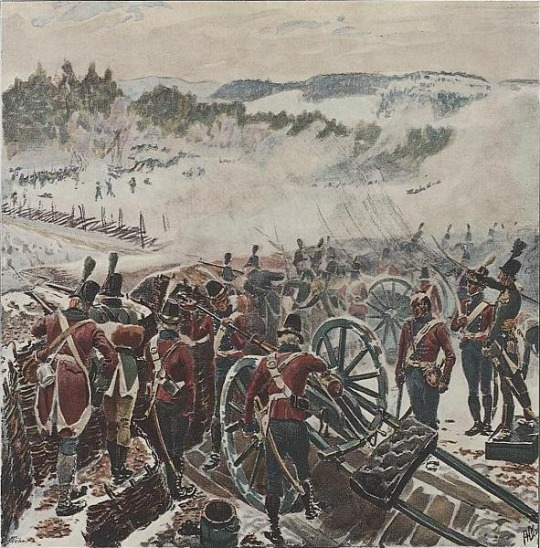
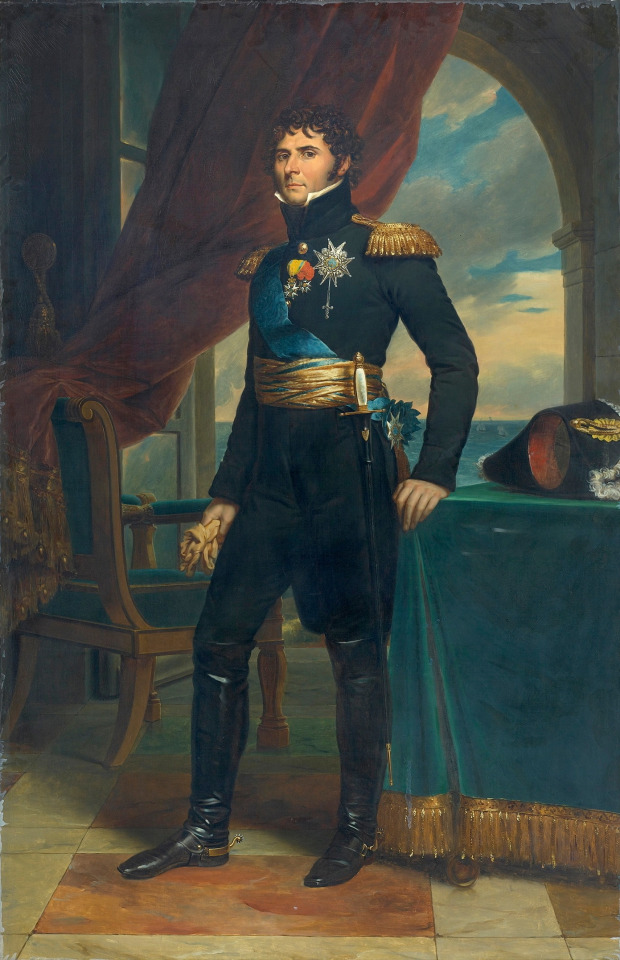
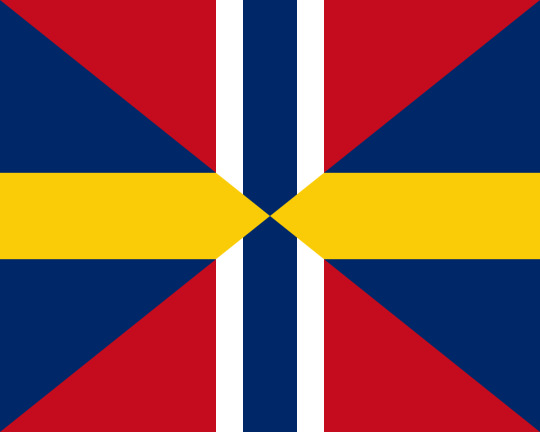
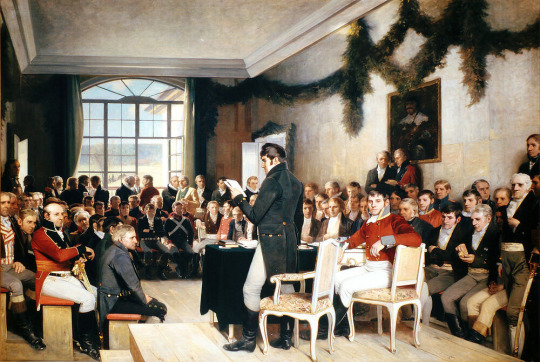
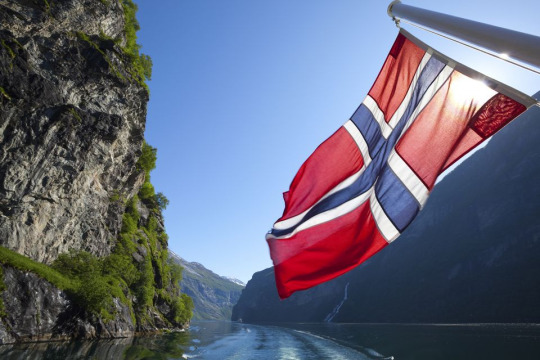
#norway#sweden#denmark#sweden-norway#swedish norwegian war#norwegian independence#syttende mai#napoleonic wars#19th century#nationalism
4 notes
·
View notes
Text
The Nordic influences in His Dark Materials
TW: Eugenics, racism, sexism
Spoiler warning: The whole His Dark Materials book series (but mainly The Golden Compass/Nothern Lights), minor spoiler for La Belle Sauvage, very minor spoiler for His Dark Materials the tv-show.
When one of my favourite podcasts Girls Gone Canon announced that they were going to start covering the His Dark Materials novels in preparation of the launch of the TV-show this fall, I got very excited. I had read the first novel, The Golden Compass/Northern Lights, as a child but remembered very little so I decided to re-read the entire series. Reading the novels now, as a nerd in my twenties that’s working on getting a master’s degree in gender studies, and is born and raised in Sweden, I quite quickly got very interested in some aspects of the series’ worldbuilding. Namely, the way “The North” and its people are portrayed. Phillip Pullman’s story takes place in several different worlds, but we start out in what I’ll call “Lyra’s world”, a world similar to ours, but also quite different. Over the course of the first novel our heroine Lyra, travels with a group of gyptians (a people that seems to be inspired of our world’s Roma people) to “The North” to recover children that a corrupt religious government agency has kidnapped. Now, exactly what counts as “The North” is slightly unclear, but the group’s first stop is the town of Trollesund in Lapland. In our world both Trollesund and Lapland exists, but Trollesund is most definitely not in Lapland. The northern most states/regions in both Sweden and Finland are called Lapland. On the first map bellow Trollesund is marked out, and on the other two the states/regions of Lapland in Sweden and Finland are marked.

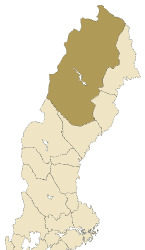

Regardless of exactly where Trollesund is, I’ve always assumed it to be in a Swedish speaking area based on the names given to characters and places in the novel. These are for example Martin Lanselius and Einarsson’s Bar (Pullman 2007, 179). These names definitely sound more Swedish than Finnish. Lanselius could possibly be Norwegian as well, but the Norwegian version of Einarsson should be Einarsen (I have no specific source for this… but Swedish last names are often constructed as [name]sson, and Norwegian ones as [name]sen.). In the television adaption of His Dark Materials Trollesund seems to be in Norway however (Cremona 2018). Now, even if I’ve tried to figure it out, it remains unclear exactly where the Lapland of Lyra’s world is, but my guess is that it’s somewhere close to the Laplands of our world. It should be pointed out that in Pullman’s other novel that takes place in the same universe, La Belle Sauvage, a character visits the town of Uppsala (also a real town), which is stated to be in Sweden (Pullman 2017, 45). So, the state of Sweden seems to exist, and be separate from the state of Lapland. Now, why do I care about this so much? Am I just curious because this is “my neck of the woods”? Well, partly yes. But I also find it very interesting that Pullman has decided to create a separate state of Lapland and have several important parts of the plot take place there.
In our world, the word/name Lapland (or Lappland in Swedish) means l*p land/country. What does l*p mean you might ask? Well, it is a derogatory term for the Sami people, a people indigenous to North Norway/Sweden/Finland/Russia. Their own name for this land is Sápmi. The Sami people have lived in this area for several thousands of years and have traditionally (and still today) used that area for reindeer husbandry, hunting, and fishing (Samer, n.d. a). For a long time, they have been a nomadic people, which has been exploited to claim that they have no claim over the land, even though they have dwelt there. To write an exhaustive account of the exploitation of Sami people is beyond the capabilities of this essay, but I recommend the site www.samer.se which is a site run by Sametinget (the parliament representing the Sami people in Sweden, that also functions as a state agency), which can be translated into English. However, it should be noted that this exploitation has been sanctioned by the Swedish state pretty much since the time of the unification of Sweden in the 16th century (Samer, n.d b). At the same time the missionary work of the Swedish church started in the area and by the 17th century Sami people were forced to attend church (Samer, n.d. c). By the end of the 19th century racist ideas of eugenics/racial biology started gaining traction in Sweden, which also impacted Sami people:
It began being claimed that the Sami were born with certain "race characteristics" that made them inferior to the rest of the population. Therefore, they could not live as "civilized" people in real houses. If they did, they would become "lazy" and start neglecting their reindeer. That would result in all Sami people having to become beggars because they did not have any skills besides reindeer husbandry. The [Swedish parliament] decided in 1928 that the Sami who were not reindeer herders would not have any Sami rights either. For example, they were given no special right to hunt and fish in the areas where their ancestors had lived. In this way, the state drew a sharp boundary between the Sami living on reindeer husbandry and those who support themselves in other ways. The Sami schooling was also affected by racism. A law about a special nomad school came in 1913 which stated that teachers would wander around the mountainous regions in the summer. There, the youngest schoolchildren would be taught in the family's cot for a few weeks each year during the first three school years. The rest of the school time consisted of winter courses in regular schools for three months a year for three years. The teaching would only cover a few subjects and it had to be at such a low level that the children were not "civilized". Children of nomadic Sami were not allowed to attend public primary schools.
[my translation] (Samer n.d. d)
This eugenics movement did, however, not just result in substandard schooling and rights in general. I have previously written about the ideas of eugenics, as well as the way the Swedish state sanctioned them, but some aspects of it is specifically relevant to highlight in relation to the Sami people. In 1922 The State’s Race Biological institute (Statens rasbiologiska institut) was created in Uppsala in Sweden, by the “scientist” Herman Lundborg (Hagerman 2016, 961). He wished to research the Swedish race, and the mixing of races in Sweden. This was done in several ways, both by looking at records of marriages and birth (often supplied by church officials who had access to so called “church books” that recorded this), and physical examinations of people. He, and other “scientists”, travelled around Sweden to examine the Sami people and other groups that were considered inferior (such as Finns, Roma people, Jews, disabled people etc). The physical examination of Sami people often happened in collaboration with local churches or schools (Hagerman 2016, 984). Another part of the eugenics movement in Sweden that is worth mentioning here is the forced sterilisations that took place during this time. As Hübinette and Lundström writes:
(…) a sterilisation law to hinder the reproduction of the lower classes, and simultaneously to increase the birth rate among the ‘better stock’ (…) The sterilisation program was in effect between 1934 and 1975, and turned out to be one of the most effective in the democratic world, resulting in the sterilisation of over 60,000 people. Moreover, it was both racialised, gendered, classed and heteronormative, as national minorities like the Travellers and the Roma were proportionally more targeted than majority Swedes, and as 90 percent were women, mostly belonging to the lower- and working-classes, and many deemed to be sexual transgressors of the patriarchal order of the day. (Hübinette & Lundström 2014, 428)
So, in conclusion, these eugenic practices had profound consequences for several groups of marginalised people in Sweden during this time. These “scientific” practices were state sanctioned and supported by officials from The Swedish Church.
Now, lets get back to His Dark Materials and Lyra’s world. I want to start by pointing out some more “obvious” parallels between people and custom’s in Lyra’s world and the Sami people and culture, and then move on to some more theme-based comparisons. Firstly, if one compares a map of Sápmi with the map of the Witches’ land in Lyra’s world, there are striking similarities:
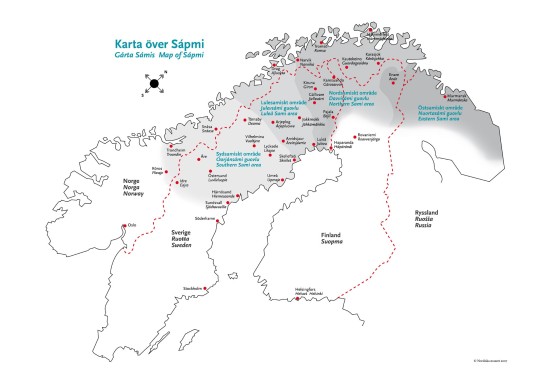
(Nordiska museet n.d.)
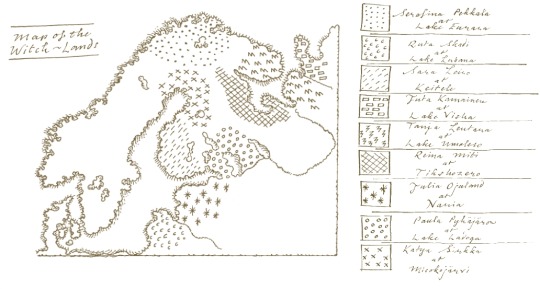
(His Dark Materials Wiki n.d.)
So, geographically there seems to be similarities between the Witches’ lands and Sápmi. But it’s not exactly the same, just as the Witches obviously aren’t exactly Sami people. However, they do also seem to have partly the same religion. The Witches (at least Serafina Pekkala’s clan) have a death goddess that they call Yambe-Akka (Pullman 2007, 305). This figure also exists in Sami religion (Oxford Reference n.d.). Her name can also be spelled Jábbmeáhkko (Samer n.d. e). Furthermore, the Witches in general seem to be very close to nature, and not as focused on material wealth etc as other humans (Pullman 2007, 299). This seems quite similar to a sort of stereotypical view of Sami people and indigenous people in general. On multiple occasions the books also describe how the Witches live close to the veil between worlds and can hear the undead whispers from beyond it (ibid, 174). This seems similar to the Sami beliefs in how a nåjden/noajdde (a shaman) could communicate with the spiritual world, including communing with Jábbmeáhkko (Samer n.d. e). However, there is no mention of actual Sami people in His Dark Materials. This seems somewhat odd, considering how other peoples from our world are called out, such as the Samoyed and the Tartars. Nevertheless, their culture does seem to have inspired Pullman’s depiction of the Witches.
I now want to look at some more comparisons between the North in Lyra’s world and Nordic/Swedish history in our world. In the story Lyra travels north to free children who have been kidnapped by The General Oblation Board (GOB) and taking to the station Bolvangar (Pullman 2007, 169). At Bolvangar the children are subjected to different medical studies and experiments. The children who are kidnapped seems to mainly come from lower classes and/or ethnic minorities (such as the gyptians). This is sadly very similar to the groups of people targeted by The State’s Institute for Racial Biology in Sweden. In both cases it was easier to experiment on people who had less power in society. As I outlined before as well, many Sami children were studied at schools and in collaboration with church officials. This seems very similar to a religious government agency taking of children to The North to experiment on them. Another thing I want to highlight is the comparison between the severing of children and dæmons, and sterilisation. In the books, children’s bond to their dæmons (their soul) are severed by the GOB in order to prevent “Dust” settling on the children (Pullman 2007, 275). Dust is considered dangerous and sinful, something that according to the church started infecting humans after their fall from the garden of Eden. Sterilisation in our world, on the other hand, took place in order to make the population “cleaner” and of “better” stock. Groups who were in different ways considered degenerate were targeted, including women who were perceived as promiscuous/sexual transgressors. In Lyra’s world a spiritual connection is severed by the Church in order to curb sinfulness. In our world a biological connection is severed by “scientists” (in collaboration with the Church at times) to control sexuality and reproduction. There is a definite similarity here.
Quite a lot more could probably be written about the similarities between the North in Lyra’s world and ours, but I have to stop somewhere. What I have tried to show here is how Pullman seems to have been inspired both by Sami history/culture, and Nordic history in general when describing the North of Lyra’s world. He also seems to have pulled quite a lot of the racism targeted against ethnic minorities in this area. However, neither of these influences are as explicit as they could have been. In the case of the Sami culture I feel like this is a shame, especially since he chooses to call a country/state Lapland. One would think that since he seems to have done some research on the Sami people, he could have chosen to call it Sápmi instead, or even just include mention of the Sami, as he does with other ethnic groups. However, many of the parallels between the experiments that takes place in the North in Lyra’s world and the experiments that have been taking place in our world are interesting, as well as horrible. I want to end this text by being clear that the sort of discrimination, exploitation and racism that I have described here is not just a product of history. Similar things still happen throughout our world. In the United States latinx children are kept in terrible conditions in concentration camps by the border (see for example Sacchetti 2019). In Chechnya there have been reports about concentrations camps for LGBTQ+ people (see for example Steinmetz 2019). In China reports state that Muslims are being kept and tortured in concentration camps (see for example Ioanes 2019). And in Sweden Sami people are still being denied rights to their land (Torp 2016; Jonsson 2018; TT 2019). We need to stay vigilante and keep fighting.
EDIT: Since Girls Gone Canon mentioned this in their excellent episode about episode 4 in the TV-show I felt compelled to make this small edit. In Trollesund we also meet the character of the sysselman. This post seems to be based on the office of “sysselmann” that exists in parts of Norway and the Faroe Islands, which is sort of like a sherrif. I didn’t consider this until after the last episode because when I re-read The Golden Compass I did so in Swedish, and the word didn’t stand out as non-Swedish. I also confused it with the Swedish word “syssloman” (which is more similar to an attorney). After realising that it wasn’t translated in the English version of the story I looked it up and realised that the word was actually Norweigan, but with a slightly more Swedish spelling (sysselMAN instead of sysselMANN). This seems to be in line with my other analysis that Trollesund has both Swedish and Norweigan influences, while Lapland as a whole also has Finnish influences. So basically Lapland seems to be a mix of Scandinavia and Sápmi...
EDIT 2: I recently realised that in Nothern Lights/The Golden Compass they mention that the “Norroway” government has influence in Trollesund (Pullman 2011, 170). Once again, this hints at the fact that Trollesund is in what in our world is Norway, as well as makes me even more confused about which states exist in the North. But I still think that Lapland is some sort of mix of Sápmi and other parts of Scandinavia.
References
Cremona, Patrick. 2019. “Where was His Dark Materials filmed?”. Radio Times. https://www.radiotimes.com/news/tv/2019-11-18/his-dark-materials-filmed-location/
Girls Gone Canon. 2019. His Dark Materials S1E4: “Armor”. https://girlsgonecanon.podbean.com/e/his-dark-materials-s1e4-armor/
*Hagerman, Maja. 2016. ”Svenska kyrkan och rasbiologin”[The Swedish Church and the eugenics]. In De historiska relationerna mellan Svenska Kyrkan och samerna: en vetenskaplig antologi [The Historical relationships between the Swedish Church and the Sami people: a scientific anthology], eds. Lindmark, Daniel & Olle Sundström. Skellefteå: Artos och Norma bokförlag [accessible online here: https://www.svenskakyrkan.se/filer/770f2627-57e5-4e06-b880-4ca6c4f94799.pdf ]
His Dark Materials Wiki. n.d. “Lake Enara” Accessed November 22, 2019. https://hisdarkmaterials.fandom.com/wiki/Lake_Enara
Hübinette, Tobias & Catrin Lundström. 2014. ”Three phases of hegemonic whiteness: understanding racial temporalities in Sweden”, Social Identities: Journal for the Study of Race, Nation and Culture 20 (6): 423-37. [accessible online here: http://www.tobiashubinette.se/swedish_whiteness_2.pdf ]
Ioanes, Ellen. 2019. “Rape, medical experiments, and forced abortions: One woman describes horrors of Xinjiang concentration camps.” Business Insider. October 22, 2019. https://www.businessinsider.com/muslim-woman-describes-horrors-of-chinese-concentration-camp-2019-10?r=US&IR=T
Jonsson, Berno. 2018. ”Stor oro bland samer när kommunen säljer mark.” [Large concerns among Sami people when the municipality sells land] SVT. October 8, 2018. https://www.svt.se/nyheter/lokalt/vasterbotten/stark-oro-bland-samer-nar-kommunen-saljer-mark
Nordiska museet. n.d. “Vem är same? Vem är svensk? Varför vill du veta?” [Who is Sami? Who is Swedish? Why do you want to know?] Accessed November 22, 2019. https://www.nordiskamuseet.se/utstallningar/sapmi
Oxford Reference. n.d. “Yambe-akka”. Accessed November 22, 2019. https://www.oxfordreference.com/view/10.1093/oi/authority.20110803125245136
Pullman, Phillip. 2007. Guldkompassen. Stockholm: Bokförlaget Natur och Kultur [this is the Swedish translation of The Golden compass]
Pullman, Philip. 2011. Northern Lights. London: Scholastic
Pullman, Phillip. 2017. La Belle Sauvage. New York: Knopf
Sacchetti, Maria. 2019. “1,500 more migrant children separated from parents at US border than previously admitted, ACLU says” Independent. October 25, 2019. https://www.independent.co.uk/news/world/americas/us-politics/trump-us-mexico-border-family-separation-migrant-children-aclu-a9170636.html
Samer. n.d. a “Sápmi.” Accessed November 22, 2019. http://www.samer.se/1002
Samer. n.d. b “Drömmen om outtömliga rikedomar i norr.” [The dream of inexhaustible riches in the North] Accessed November 22, 2019. http://www.samer.se/1229
Samer. n.d. c “I Guds tjänst” [In the service of God] Accessed November 22, 2019. http://www.samer.se/4441
Samer. n.d. d “Samepolitik i rasismens tidevarv” [Sami politics in the time of racism] Accessed November 22, 2019. http://www.samer.se/1042
Samer. n.d. e “Kontakt med andarna” [Contact with the spirits] Accessed November 22, 2019. http://www.samer.se/1139
Steinmetz, Katy. 2019. “A Victim of the Anti-Gay Purge in Chechnya Speaks Out: 'The Truth Exists'” TIME. July 26, 2019. https://time.com/5633588/anti-gay-purge-chechnya-victim/
Torp, Eivind. 2016. “Girjasmålet – rättsprocessen” [The Girjas case- the trial proceedings] Accessed November 22, 2019. http://www.samer.se/4997
TT. 2019. ”Tvist mellan sameby och staten avgörs i HD” [Dispute between Sami village and the state to be determined in the Supreme Court] Aftonbladet. September 2, 2019. https://www.aftonbladet.se/nyheter/a/e8XrOl/tvist-mellan-sameby-och-staten-avgors-i-hd
*this is a chapter from The Swedish Church’s white paper about its treatment of Sami people.
13 notes
·
View notes
Text
Hetalia human names
All information come from Google or what I already know about the language/culture. About 3 hours of research went into this. Honestly if someone saw my browser history they’ll think I’m pregnant or something. Warning: This is a hella long list. Everyone will be on it.
America - Alfred F. Jones
The “F” stands for whatever he wants to it to be
Ancient Egypt - Isis
No surname as the ancients do not have surnames
Isis after the Egyptian goddess of life and magic
Ancient Greece - Athena
Athena after the Greek goddess of wisdom and patron goddess of Athens, capital of Greece
Ancient Rome - Romulus
Romulus after the legendary founder of Rome
Australia - Jacob “Jake” Kirkland
All of England’s ex-colonies that are part of the Commonwealth has the surname Kirkland
Jacob is one of the most popular boy’s name in Australia
But because Australians abbreviate everything he’s adamant that everyone call him Jake
Austria - Roderich Edelstein
Belarus - Natalya Arlovskaya
Belgium - Angelique van der Velden
I gave the Benelux the same surname
Bulgaria - Nikolaj Ivanov
NIkolaj is one of the most common boy’s name in Bulgaria
One of the most common Bulgarian last names, it means “son of Ivan”, which is appropriate as there are many Bulgarian rulers named Ivan
Canada - Matthew Williams
China - 王耀 (Wang Yao)
Cuba - Carlos Machado
Denmark - Magnus Densen
Egypt - Gupta Muhammad Hassan
England - Arthur Kirkland
Estonia - Eduard von Bock
Finland - Timo Väinämöinen
I chose Timo instead of Tino as Timo is actually a Finnish name
France - Francis Bonnefoy
EDIT: Thanks to @feynavaley. Francis is the older version of François, which considering his age would be more appropriate
Germania - Folkert
Folkert means “strength of the people”, which is strangely appropriate for the personification of a nation
Germany - Ludwig Beilschmidt
Beilschmidt as last name because he’s Prussia’s brother
Greece - Herakles Karpusi
Holy Roman Empire - Otto Beilschmidt
Beilschmidt as his surname because I count him as one of Prussia and Germany’s brother
There are many Holy Roman emperors named Otto
Hong King - 王佳龙 (Wang Jia Long), English name Leon
Same surname as China, as I perceive the autonomous provinces as his younger siblings
龙 means “dragon” and 佳 is a common character used in Chinese names, both male and female, that means “well” or “good”
Hungary - Erzsébet Héderváry
I chose Erzsébet instead of Elizabeta or Elizaveta as both of these names originated in the Russian name Yelizabeta while Erzsébet is Hungarian in origin
Hutt River - Lucas Kirkland
Lucas is a popular boy’s name in Australia that means “shining”, which is appropriate as he is richly dressed and rich in general
Iceland - Emil Steinsson
I used Steinsson instead of Steilsson because in Iceland there is no surnames only patronyms and Steil is not an Icelandic name
Ireland - Aengus Kirkland
EDIT: I changed my mind
Aengus is the Irish Gaelic variant of Angus
Japan - 本田菊 (Honda Kiku)
Kugelmugel - Hubert Edelstein
Hubert means “bright mind”, as he is an artist, this is very appropriate
Ladonia - Eriand Oxenstierna
Eriand is a Swedish name that means “foreigner”, appropriate as Ladonia exist in the internet
Latvia - Raivis Galante
Liechtenstein - Lilli Vogel
Lithuania - Tolys Laurinaitis
I chose this particular spelling as these are actual Lithuanian names
Luxembourg - Luca van der Velden
Luca is one of the most popular boy’s names in Luxembourg
Macau - 王诚 (Wang Cheng), English name Vincent
诚 means “sincere”
Moldova - Alexei Popescu
Alexei is one of the most popular boy’s name in Moldova
His surname is the same as his brother, Romania’s
Molossia - Casper Jones
Casper means “treasurer”
Monaco - Elodie Bonnefoy
Elodie is one of the most popular girl’s names in Monaco, it means “foreign riches”
Bonnefoy after France
Netherlands - Abel van der Velden
“Van der Velden“ is a common Dutch surname that means “of the field“ which is suitable because of agriculture
New Zealand - Noah Kirkland
Noah is one of the popular boy’s name in New Zealand and its biblical reference is appropriate as New Zealand is an island country
Northern Ireland - Connor Kirkland
EDIT: Seeing Northern Ireland as a separate entity from Ireland has not existed for that long, I chose a more modern-sounding name that is more commonly used
North Italy - Feliciano Vargas
Norway - Sigurd Bondevik
Persia - Shapur
Shapur after the Persian king
Poland - Feliks Łukasiewicz
Portugal - João Silva Fernandes
Silva and Fernandes are both very common Portuguese last names
Fernandes is the Portuguese variant of Fernandez, even though Spain and Portugal aren’t brothers, but they are related
João is a common Portuguese given name
Prussia - Gilbert Beilschmidt
Romania - Andrei Popescu
Andrei is one of the most common boy’s name in Romania
Popescu is a common Romanian surname
Russia - Ivan Braginsky
It’s Braginsky not Braginski as surnames ending in “-ski” are Polish
Scotland - Alasdair Kirkland
The UK brothers are all using the same surname
Alistair as commonly seen in fanon is the Anglicised version of Alasdair, and Allistor is NOT a name
Sealand - Peter Kirkland
Seborga - Sebastiano Vargas
Seychelles - Michelle Macham
Macham is the surname of the first president of Seychelles
South Italy - Lovino Vargas
Spain - Antonio Fernandez Carriedo
Sweden - Berwald Oxenstierna
Switzerland - Basch Zwingli
Vash sounds like the French word for cow (vache)
Taiwan - 王梅 (Wang Mei)
梅 means “berry” and it sounds like the Chinese word for beauty (美) and younger sister (妹)
Turkey - Sadık Adnan
Ukraine - Iryna Chernenko
Vietnam - Nguyen Ha Lien
Nguyen is the most popular surname in Vietnam
Ha means “river”
Lien means “lotus”, which is Vietnam’s national flower
She would be addressed as Lien as that is how Vietnamese names work
Wales - Dylan Kirkland
Dylan is a Welsh name that means “son of the waves”
Wy - Wendy Kirkland
#aph#hetalia#hetalia human names#human names#headcanon#headcanon dump#i did not listen to toxic by britney spears on loop this time#it was celtic woman#they're great btw#aph headcanons#my stuff
30 notes
·
View notes
Text
Some Eurovision 2018 thoughts
Because I promised @isabellaofparma I would post these, that’s why. I should note, I wrote most of this before the rehearsals and saved it as draft, so there are only a few added touches before posting.
Also, can’t believe it’s almost a year since ESC 2017. @beautifulhusbands, remember when we chatted about last year’s competition? Good times.
OK, here are a few thoughts about some of the songs by country...
Hungary - thing for me is, I love rock songs at the ESC, so a rock song has to work really hard for me not to like it in this competition. Still, this one feels particularly authentic, so major kudos, it’s my fave rock song this year (sorry, @i-want-messed-up-with-you-4-ever, though the Netherlands’ country rock entry is nice too. @letthebluerain we also have a cute light rock song from Romania, but I have to admit I’m always disappointed when I don’t get a song in Romanian from the country I was born in. But I actually adore that we have more than one rock song this year, I like this diversity). @isabellaofparma, I still love last year’s Hungarian entry more, but that’s because it became one of my fave ESC songs ever, not because this year’s offering isn’t good.
FYR Macedonia - I saw some people saying this song is a mess of genres, but I don’t think that’s the issue. You can throw in five different musical genres and as an idea, it could still work well. For me the problem is every time I get into a particular portion and genre and I start enjoying myself, the song switches over. So I’m left unsatisfied by the whole thing.
Greece - I like this song. I adore all songs that are in their country’s native language rather than in English, even though I get why so many choose to perform in the latter. So this song gets points for that, has an ethnic sound to it which I also like and generally, it seems like Israelis tend to like the Greek songs. So yeah, one of my faves this year. I think it has a real shot at being the winner. (isn’t @nvrtickleadragon Greek? I like relating songs and countries to people. So go you!)
Belarus - this may be weird but the singer reminds me of the guy who played the (more) openly gay teenager on Witness (I miss that show so much). That does things to me. So I like this entry, but it may not be for the right reasons. I think how this will do will greatly depend on how it’s executed on stage.
Italy - I have to say, I adore the Italian tendency to send songs in Italian as it’s one of my fave languages. This entry is nice musically, though I think one of the singers is not as good as the other one and the disparity takes away some of my enjoyment. Also, I’m not fond of the tendency to send 'from the headlines’ songs, though relatively to the genre, this one is nice. All in all, my feelings are it could have been better and it could have been worse. At least the hook is catchy. (I believe @robertjacobsugdens is Italian, right? Again, me with the relating stuff to people thing. I do believe you guys will do well this year even if this isn’t my fave entry this year, nor my fave Italian song to the ESC) Also, technically, I wanna rant over the fact that there actually ARE pacifist bombs. For example, there are bombs used specifically to destroy other bombs in a controlled manner that saves lives. So. I don’t know. I don’t like an oversimplified message is what I’m saying, I guess. Kinda makes you wonder why I listen to ESC then, right? ;p
France - This is another one ‘from the headlines’, so once more, I’m a bit meh. It’s a nice, lovely tune, I adore that France always sing in French, but the song becomes too familiar too quickly in my opinion. I’m sorry, @iamarobronniffler, I think you guys will get a high score, but I don’t think it will win... I also think it was sort of hurt by being one of the first songs to be released, which means people had loads of time to get used to it... Personal pet peeve is that the singer pronounces ‘Mercy’ not like the English word the name derives from, but like the French word ‘merci’, which is a nice touch, but it starts bothering me towards the end of the song, when the name is repeated (and mispronounced) so much.
Denmark - ok, so on first listen? It’s a really strong entry. The drums are epic, the staging is good, the production of the song is tight, the legend behind the song of Vikings who decided not to fight is cool, it is a catchy song, Rasmussen has stage experience so the odds of him faltering on the night are slim, thus this song has SO MUCH going for it. Usually, if you have a song like this and you come from one of the two blocks (the Soviet or the Scndinavian ones) I feel like you have it in the bag. That’s how I felt about Sweden’s Heroes and Denmark’s Only Teardrops and they both won. But I feel like one thing that works against the song is that it has something about it that’s almost too serious and in a year where a lot of things are less so, plus this year is very innovative while this song is classically epic, that may work against it. Also, I feel like years when the Scandinavian countries send more than one strong entry, that end up splitting the Nordic vote and negates the block advantage. This year, you have Finland with a strong entry too, plus Sweden being Sweden. Basically, I feel like this could have been the winner in a lot of years, but probably not this one.
Portugal - feels like an attempt to send a song in the same genre of their winner last year and I think the odds of the same country winning twice in a row with the same type of song is slim to none. That being said, I think this year’s offering is lovely and way better in this genre than last year’s Portuguese song. Sorry, I still don’t think that guy should have won.
Sweden - hmmm, this will do well, first of all because it’s Sweden (really, @stulot, it’s ridiculous what an empire you are in this sense) and because it has a nice, young Michael Jackson vibe. But I really don’t think it’s gonna win. It doesn’t stand out enough in my opinion. Plus, the Danish and Finnish contenders are stronger IMO, so my guess is a lot of Scandinavians votes are gonna go there rather than to Sweden. It’s a good song, it’s just not enough of a competition when even within Scandinavia, it’s only the third strongest song.
Ireland - the song is sooooo sweet, it’s almost too much so. It gets a bit better once you realize it’s actually about a relationship that has ended, it gives the idea behind it a bit of a twist than if it were just a declaration of sickeningly sweet love, but the real gem for this entry is the clip. It’s openly showcasing a same-sex couple and I am SO happy about that! Despite its gay reputation, ESC is actually more heteronormative than you’d expect, so that clip made me really happy. I want it to do better than it might have otherwise for that alone. I'm glad they’re bringing it to the stage in Lisbon too. I’m annoyed (though not surprised) that Russia said it would cut this song out. Thing is, Russia is allowed to do that in the semi-final, but not in the final, so for that reason if nothing else, I want Ireland in the final. (person from fandom that this made me think of, @dannymiller-irish-fan. Promise I’m done with the tagging now... I think)
Cyprus - this is a very typical ESC song, it’s fun and tightly produced so it will do well, but I’m not happy about the lack of originality, plus the pushing of the ‘sex sells’ angle is not something that I subscribe to.
Bulgaria - this song feels very current, easily a pop hit you could hear on the radio rather than on the ESC stage. I enjoy it, I think a lot depends on the live performance, how the staging will go, how will their voices blend live, but I think it can be the winner.
Estonia - it’s weird, I think her voice is stunning beyond measure, the song is perfect opera pop, I enjoy it whenever I hear it and yet it’s not a song I can see myself listening to outside of the competition. Maybe because it’s not exactly one you can sing along to. All the same, another possible winner IMO.
Finland - So this is the strongest Scandinavian contender in my book (so @youslicetheginger, I think you guys have a shot). The song is classic ESC, it’s also well produced and performed, which is really important, so that takes a bit away from the fact that it’s not that original. However, you gotta add in two more advantages, both originating in Saara Aalto being the one performing it (beyond the fact that SHE CAN FUCKING BELT). One is that she was on singing reality shows in both Finland AND the UK before the contest, which probably makes her the most established artist of the whole lot before the competition. That matters because while the Scandinavian vote is split up this year, she can make up for it through fans of hers from outside Finland and Scandinavia. The other is her being open about her engagement to a woman. This, together with the possible LGBTQ reading of her song, I think can also get her a lot of votes. So basically, out of the Nordic countries, I believe she’s gonna place highest. And I’m definitely a fan.
Iceland - the most interesting things about this clip and its video: the church you can see in the clip, the streets Ari (the singer) walks down in it, are ones I’ve seen and walked too, which was pretty cool to me. Ari means Eagle in the Scandinavian language, which is a cool coincidence with the fact that in Hebrew, the same name means lion. ‘But Alice, these interesting tidbits have nothing to do with the song!?’ you say? Exactly. Sorry, Ari, you look like a lovely guy, you damn well can sing, but this is the biggest bore fest this year. You deserved a better song.
Norway - This is the definition of “don’t know when to call it quits”. What’s worst to me is Alexander tried to make it better by saying kids keep asking him how to write a song and this was his reply to them. Either he’s lying and just trying to get the audience to go all ‘awwww’ over his very banal song, an inferior version of the song he had won with in the past... or he’s honest, in which case, STOP LYING TO THE KIDS, Alexander. That is NOT how you write a song.
Ukraine - I think this is such a cool, different song performed by a cool, different artist, it’s upbeat, it’s not preachy, it’s unique, it’s catchy, I love it. I don’t think it will win, but it’s another one of my faves.
Spain - this love song made me think of @imre-gr, of course. It is sweet and lovely. It was the first song I heard that made me smile, so how could I not think of you? But then, I have to admit that it is very much the typical ESC love duet and while it’s a very good version of it, in a year full of unique and different songs, I don’t think it stands a chance to win. Sorry. :(
Israel - honestly, my first reaction when the song was first released was, ‘ok, so we will not win this year either’. I still think it’s too divisive to win (I know the bookkeepers disagree, but I think they mainly rely on how many views the song clips get on YouTube and that is NOT a measure for which one will win the ESC), I think the song’s too original, too creative and TOO out there, not enough people get why the chicken bits were included, too many people started arguing about whether this is a feminist song or an anti-male one, but I was happy to see it was less divisive than I anticipated and that a lot of people have responded so positively to the song, to its message of self-empowerment and to Netta. I can’t think of anything better than so many people seeing a woman who is clearly nothing like the thin ideal of beauty in our society singing “I’m a beautiful creature”, getting that she means it and agreeing with her. Netta in simply who she is conveys a real message and spirit of change for the better. The song itself tries to tackle a serious issue but without being preachy or heavy about it, make it fun for people when they sing about feminism and embracing yourself and your strength as you are. I feel like this attempt sometimes means the lyrics aren’t clear enough (as the song is inspired by the #metoo movement, ‘stupid boy’ doesn’t feel like a harsh enough term for the sexual harassment the song refers to, plus it can too easily be used to make it seem like the song is anti-male, because people take it as if ‘stupid boy’ is referring to all men rather than to jerks who take advantage of women), but I still appreciate what it tries to do. And at the end of the day, I think Netta is fabulous, I think she got her message across, I think her song became popular way beyond the bounds of the competition, so in my eyes, even if she won’t win the contest, she’s a true winner and wonder woman. I’m proud of you and thank you for representing in such an amazing way a huge part of the beauty of my country on its 70th anniversary. <3
#esc#eurovision#Eurovision 2018#netta#netta barzilai#toy#Israel#Israeli Music#what am i doing with my life
39 notes
·
View notes
Note
I've just read a book by a Swedish finish author and man, that was wild. I've Googled it to death, but still don't get it. There's like a Swedish elite in Finland who (as a class, not as people) thinks of itself as better? And they have names for places and streets in Swedish? And that has newspapers? Is it still like that? Is there like... A colonization type of situation?
hi there! okay so this is a bit of a complicated subject as there are many Opinions, and i don’t want to claim that my views represent everyone in this country.
you may have googled this already, but finland was part of the kingdom of sweden for 400 years until 1809 when sweden lost a war to russia and russia claimed finland, which resulted in the formation of finland as an autonomous grand duchy within the russian empire and later on establishing itself as a sovereign nation in 1917. we share long historical ties between sweden, and swedish remains our second official language. 5% of the population speak it as their first language. these are all finnish nationals whose first language just happens to be swedish. and yes, there are swedish language newspapers, universities, and tv shows, even a political party. in some places street names are also in swedish. board a train and you’ll hear hyvät matkustajat tämä on intercity-juna helsinkiin bästa passagerade det här är intercitytåget till helsingfors ladies and gentlemen this is an intercity train to helsinki in all three languages. (funnily enough the finnish and swedish announcements are gender neutral while in english we all become ladies and gentlemen).
what makes this a bit of a sensitive topic is the fact that even though only 5% of the population speak swedish as their first language, for the rest swedish is a mandatory subject at school. you are expected to be able to provide service in both finnish and swedish regardless of your native language, and to ensure this you must pass a field-specific swedish language test to graduate university. unlike, say, norwegian and swedish which are mutually intelligible, finnish and swedish are not related at all, so we’re talking about two completely different languages with completely different grammar and vocabulary. my personal opinion on the matter is that compulsory swedish language education in finland is a failure at least in its current form, illustrated by the inability of many pro-swedish politicians to provide their pro-swedish statements in swedish. (there is a whole political power play there which i won’t get into here.)
so yeah, it’s a nuanced situation, but it’s not by any means a colonisation type of situation. there is a stereotype of the swedish-speaking minority as being rich and powerful stemming from history, and it is partly true even today. they are sometimes mockingly referred to with the swedish term bättre folk, better people. however, there is no real oppression from either side. in fact, the swedish speaking elite are the ones that first birthed the idea of finland as a unified nation with its own unique culture when so far finnish people had existed in tribes without a shared identity. finland as a sovereign nation and as a national identity would not exist without the swedish speaking elite. a divide does exist, but i’d say it is not as deep as it is in some other countries in europe with multiple official languages.
#now i'm interested in what the book is!#i only know a book by a finnish speaker from sweden about the poor treatment of finnish people in sweden#asks
6 notes
·
View notes
Text
It's sometime in the 1200’s. Men have come from the west, and they speak the language some - not you necessarily, but some -of the people on this small strip of sparsely populated land recognize, even if they don’t understand it. You’ve traded with the western men before, been attacked by them as well, just like a while ago, when they came. You and your people struck back, but nonetheless. Someone tells you that you must pay taxes now. You have a king now. You are handed a cross. You have a king now. A Swedish king.
It’s 1809. You are in Porvoo. The war is still ongoing, but yet, here you are, to swear an oath to your new king. No, this is no king, this man is an emperor. Alexander the First. He promises you that you can keep your religion, your old Swedish laws and your rights. The estates swear their oaths of allegiance. At the end of the ceremony, the tsar tells you that you and your people have now been heightened to a nation among nations. You are not sure what that means - there is no nation, no country, just nine provinces, the Åland islands and some land from the north, where Tornio- river marks the border between two countries - the one you belonged to yesterday and the one you’ll belong to from this day on.
Next autumn, the Treaty of Fredrikshamn is signed by the representatives of both, the Kingdom of Sweden and the Russian Empire. Sweden gave up the nine läns, the islands and the strip of land from the north forever, and they would be forever a part of Russia.
You wonder what you should do. Russians have given the citizens three years to decide where they wish to live; Sweden or Russia. You don’t particularly like either option, but there is no third option. There is no land between east and west.
It’s 1899. The tsar, Nicholas the Second, did not agree to meet with the men bringing him the Great Petition to end the February manifesto. The Grand Duchy of Finland does not have its own postal service anymore. The diet can no longer decide the laws; Russians decide them now. You don’t understand how the emperor could do this to his loyal citizens. They’re telling rumours that there are people in Russia who want to take the autonomy away once and for all. You hope those are only rumors.
It’s 1917. Everything is chaos.The Great War is raging. There was a second revolution in Russia; the bolsheviks have the power now. You are at a loss of what to do. The Finnish Parliament declares that it now holds the greatest legislative power in the Grand Duchy. The working class and the middle class are not getting along, haven’t been since the years of oppression. Everything is changing - you can feel it.
It’s 6th of December, 1917. The Parliament has just approved the declaration of independence made only two days earlier. Now, for the first time ever, you all have to stand on your own two feet - there is no motherland to take care of you if you mess up. You wonder if you’ll survive a decade here, in this sparsely populated land between east and west. You swear to do everything it takes.
It’s 2017. Some teenage girl is writing this pretentious text at 3:15 AM in November. In the independent Republic of Finland.

Finland’s 100 years of Independence
6.12.1917-6.12.2017
Finland is both very old and very young. The ancestors of the people living in Finland today - and of the Sami people especially - are among the first humans to have settled down in Europe, and the bedrock on which Finland rests is among the oldest in the world. However, the Finnish written language was developed only in the 1500’s by Mikael Agricola and the first books written in Finnish were published in 1870. In the 1700’s, the concept of “Finnish” being separate from “Swedish” regarding the language and some cultural aspects was born, but really being Finnish like we are Finnish today wasn’t born until the latter half of the 19th century.
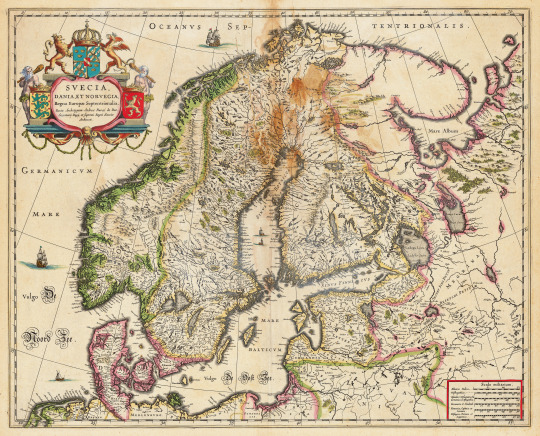
Parts of the area known as Finland today were annexed by the Kingdom of Sweden at different times. Some areas of Finland were a part of Sweden for around 600 years, some less than 60. As a part of Sweden Finland wasn’t really… Finland. It consisted of the provinces, or läns, though one of them was called Varsinais-Suomi, Proper Finland, or Egentliga Finland in Swedish. Only in 1809, when Sweden lost the Finnish War to the Russian Empire and gave up its eastern areas, did Aleksanteri I, Alexander I, unify the läns under the name “Suomen suurruhtinaskunta”, “the Grand Duchy of Finland” and make the Grand Duchy an autonomous region within the empire.
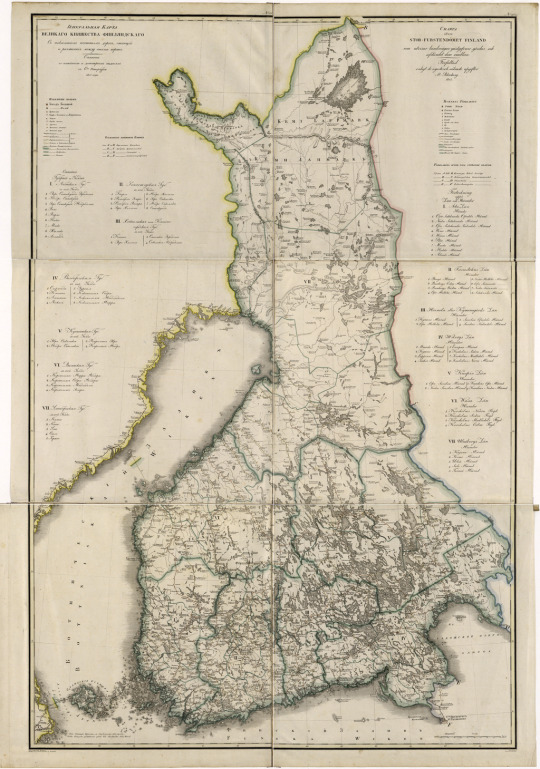
As a part of Russia Finland was doing quite well, better than as a part of Sweden. It’s impossible to say if Finland would’ve been better off as a part of Sweden all along, but it can be said with certainty that as a part of Sweden Finland most likely wouldn’t have become an independent country. The Diet of Finland wasn’t called until 1863 even though Alexander promised to do so in like 1812, but Finnish people either didn’t mind or didn’t care. Finland was also one of the most peaceful parts of the Russian Empire; the Finnish people were either very loyal to the czar OR, again, they didn’t really care. Nonetheless, Finland gained its own postal service, currency and eventually the Diet was called as well. The Finnish language was to become equal to Swedish in 20 years, and the national awakening was bringing with it the Golden Age of Finnish Art.
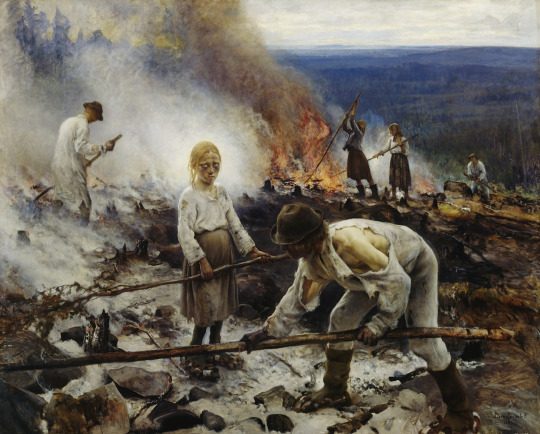
A product of the Golden Age, Raatajat rahanalaiset (Kaski) (1893) by Eero Järnefelt, English translation being “Under the Yoke (Burning the Brushwood) ; Wage Slaves / Burn-Beating”.
In 1899, just as Finland had started to embrace its Finnishness, the Russification of Finland, known in Finland as Sortokaudet, the Years of Oppression, began with the February Manifesto by Nikolai II, Nicholas II. The postal service had been shut down earlier, but now all the power from the Finnish politicians in the Diet was given over to the Russians. The use of Finnish was no longer encouraged, now everyone was forced to learn Russian. Finnish people tried to appeal to the czar, students collecting half a million names (about ¼ of the population) into the Suuri adressi, the Great Petition, by skiing from village to village, only for the czar to decline the delegation. Finnish politicians started to be replaced by Russians. Finland was slowly losing its autonomy.
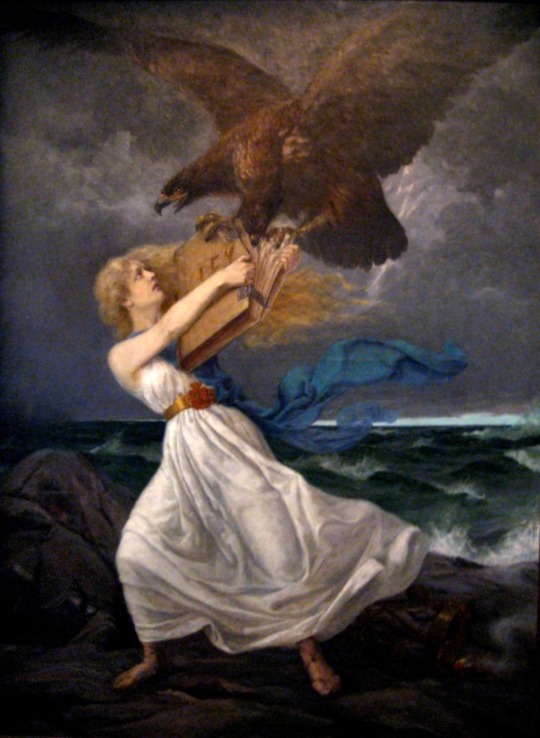
A famous painting, Hyökkäys (1899) by Edvard Isto. The name of the painting means “An attack”. It depicts the Russian double-headed eagle trying to rip the lawbook from the hands of the Finnish Maiden, the national personification of Finland. It became a symbol of the resistance towards the Russification of Finland.
In 1905 the revolution ended the Russification, and the Finnish Parliament was formed - it has barely changed since, by the way. With this reform of the Finnish political system, Finland also became the 2nd country in the world to give women the right to vote, and the first country in the world to give everyone, regardless of gender, equal political rights. The first women in the world elected as Members of Parliament were Finnish. After this brief period of time Russification was put into action again. It was only ended by the October Revolution in 1917. Which brings us to our next topic...
End of the Year 1917
In 1917 the two Russian revolutions took place, at the beginning and at the end of the year.This unrest made the working class and middle class, who were not on very good terms with each other otherwise, to agree on one thing: They wanted independence.
On November 15th the Finnish Parliament declared itself to hold the highest legislative power in Finland.

A newspaper article from Viipurin Sanomat from 10.11.1917, telling about the decision the Parliament made to transfer the power (in Finland) that earlier was held by the czar to 3 people chosen by the Parliament.
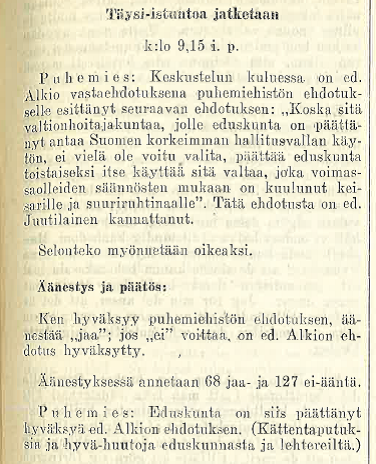
The suggestion, voting and the final result of the plenary session where the Parliament ended up deciding to ditch their previous idea of electing those 3 people and just having the legislative power to itself.
On 4th of December the government - or P.E. Svinhufvud’s Independence Senate (P.E. Svinhufvudin itsenäisyyssenaatti) - gave the Declaration of Independence.

A picture of Svinhufvud’s Senate and the original Finnish Declaration of Independence. A link to the English translation of the text.
On the 5th, the Declaration was published for all the people of Finland to see - however, the rising tensions between the working class and the middle class, as well as the famine closing in kind of distracted the people.
On December 6th the Parliament voted in favor of Independence. The votes were 100-88, those 88 being the Social Democrats who’d wanted to negotiate with the bolsheviks before independence. This day was chosen as the national day of Finland, the Finnish Independence Day. However, on 6th of December in the year 1917, the newly gained independence did not stir much positive emotions. According to the memoirs of a Finnish author, Lauri Arra, that year, “everyone waited for or sensed that some terrible disaster was going to happen”. This terrible disaster was waiting for the newly born nation in the January of 1918, only a few weeks later.
To be a real country, other countries must recognize the independence first. Right away Finland asked Sweden, Denmark, Germany, France, Norway and Great Britain to recognize the new country’s independence. You might have noticed that a key player in this becoming-a-country-independent-from-Russia-and-asking-others-to-recognize-our-breaking-away-from-Russia-process is missing: Russia.
No, Finland did not ask Russia to recognize our independence at first. However, all the other countries refused to recognize Finland as independent before the country Finland was trying to break free from approved of said breaking free first, and so Finland had to turn eastward with an apologetic smile and go: “...Please?” I mean, I assume that’s how it went, I dunno, I wasn’t there.
The first ones to make a move were the Social Democrats: they asked their eastern comrades to recognize Finland as a proper nation. Lenin agreed to do so if someone came and asked. On 29th of December Svinhufvud himself, with the other negotiators, traveled to St. Petersburg. The Finnish delegation was forced to wait for hours in some room outside the room where all the important stuff was happening.
Then, just before midnight, literally minutes before the year 1917 came to a close, the Finns were handed a note, a piece of paper, with which Soviet Russia recognized Finland as an independent nation.
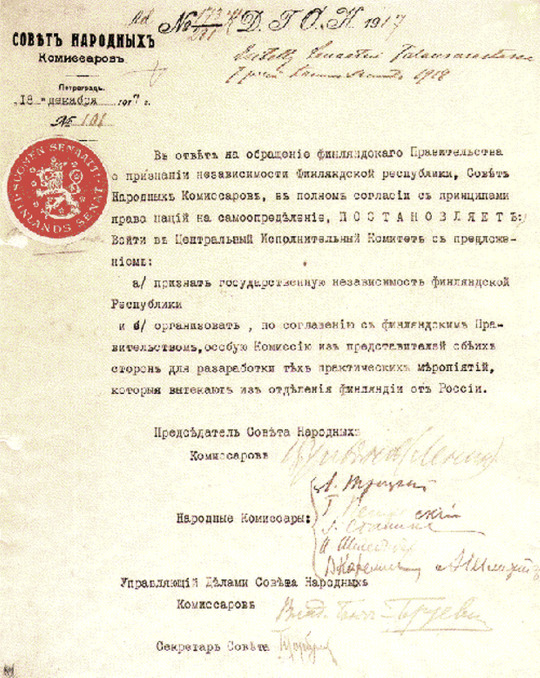
Said piece of paper.
Recognition
Soviet Russia was the first country to recognize Finland’s independence on December 31st, 1917. The confirmation for the recognition was given on January 4th, 1918. The next countries to recognize Finland as a country were France, Sweden and Germany, on January 4th as well. Other countries followed, even though countries like USA and Great Britain recognized Finland only after WWI, to make sure Finland wouldn’t go and join the bad guy Germany, so to say. (Krhm.)
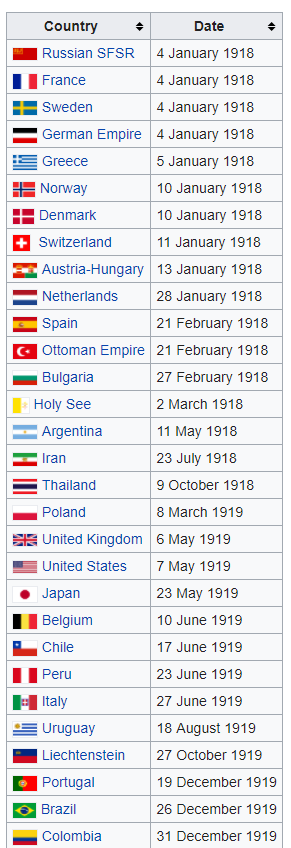
A screencap of the Wikipedia article on the Finnish Declaration of Independence because it had the handy list here. On top of these countries, Romania, Venezuela, Panama, Ecuador, Mexico and Hungary recognized Finland in 1920. Paraguay and Luxembourg followed in 1921, Serbia in 1922, and finally Afghanistan and Albania in 1928.
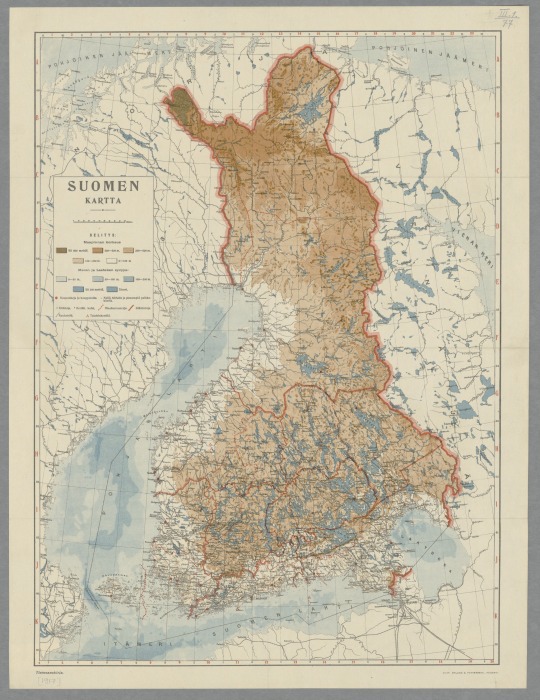
Map of Finland in 1917.
Here’s the end of part 1 of the Finnish Independence post. This focused on the history, but the next part, which I will hopefully publish soon, will focus on how we celebrate our independence. I hope you enjoyed.
Hyvää itsenäisyyspäivää!
#hetaliafandomdirectory#suomi100#finland#aph finland#finland's independence day#hetalia#hey it's sort of in time!!#i underestimated my need of sleep#so this is like 6 hours late#i apologize deeply#I hope you like it!!'#i'm pretty sure these are old enough to be in public domain#enjoy!!!!
2K notes
·
View notes
Photo
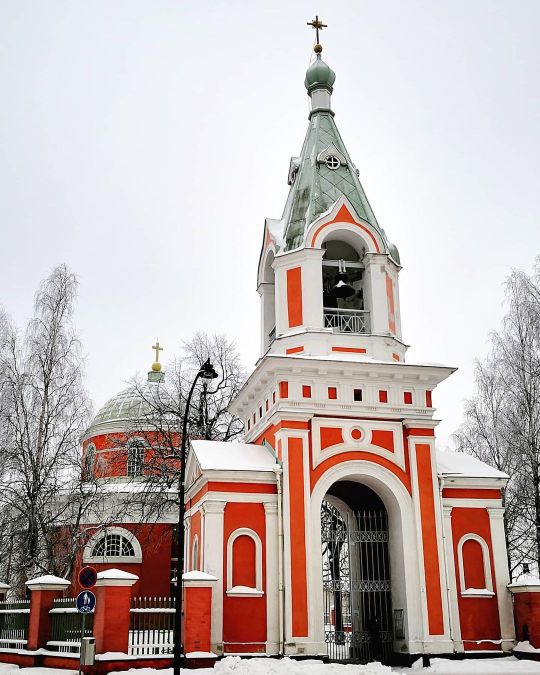
This Orthodox Church in Hamina is the Church of St. Peter and St. Paul's. Quite interesting eclectic features with a mystery architect. The bell tower in the front looks more like the Orthodox churches of that era with neoByzantine style (1863) whereas the round church building has a neoclassical style and was consecrated in 1837. I have checked various sources in Finnish, Russian, and English but I'm still not sure who the real architect was. This is weird considering the fact the Finland has a great national archive system, keeping detailed accounts of all important stuff, dating back to 1500s. For example you can find accounting books of a municipality from 1700; the best archives in the world about Russian Empire is not in Russia but Finland. So some sources say it was Louis Visconti (French-Italian), some say it was David Visconti (Swiss) and others just don't mention a name. Both architects used neoclassical style but David Visconti might be the one who designed this church, not that I heard his name before. During 1830s Louis Visconti was busy designing châteaus and mansions and private residences for the rich in Paris; he even designed Napoleons tomb in Les Invalides! Meanwhile David Visconti was in St. Petersburg designing churches (for example the Church of St. Stanislaus, looks pretty similar with a round dome, even though it is a Catholic church. His family had been living in St. Petersburg since 1798). I read that in 1821, the fire in Hamina destroyed the previous Orthodox church and the inhabitants were so poor, they couldn't renew the church. It took many years to find the funding and the Governor-General of Finland at the time asked money from the Emperor Nicholas I. 4 years after its opening, the church was damaged in another fire and this time the parish couldn't even find the money to repair it. Would it be possible that the townsfolk went and hired a private architect from Paris famed for designing châteaus with their nonexistent funds? Or was it an architect hired from a nearby city who was known for designing churches? Even the researchers couldn't find the signature of an architect on the original approved plans so sho am I to comment :))) (at Hamina) https://www.instagram.com/p/CLhVxw7HUnC/?igshid=1n7bp3shycr27
0 notes
Text
I made this for the lovely @nordicswonderland for her birthday! Happy belated birthday – I hope you like it! :D (Nothing like SuFin fluff)
“I’m Trying to Cheer You Up”
“…or we can go to dinner? Maybe a movie afterwards - or instead! We could just eat here then catch a movie at seven, what do you think?” Finland grinned as best as he could, eyes lit with hope. Unfortunately, his excitement was dashed. “I dunno. Whatever ya’ wanna do.”
Finland sighed, deflated. “Sve, I’m trying to cheer you up. I can’t stand to see you so upset.” He took the other’s hands, violet eyes filled with concern. “Come on, tell me what’s wrong. Please. Did I do something?” Sweden said nothing, instead silently shaking his head and looking away. “Tell me then. It hurts me to see you hurting all by yourself, let me help.” “…Sorry. Don’t want ya’ to hurt ‘cause of me.” “No, no Sve! It’s ok! If you’re sad, you’re sad! Just…tell me why. I want to help you as best as I can.”
“…I’m not good with words.” A corner of Finland’s mouth lifted slightly. “I don’t care about that. Just do your best.” He laid a hand on the taller man’s shoulder and leaned forward to rest his head there. Sweden gulped, turquoise eyes blurring with tears again. “I…I miss ya’.” Finland brought his arms around Sweden’s torso. “But I’m here now, Russia wouldn’t dream of touching me!” He smirked and nodded towards the gun hanging on the wall. “No…not like that.”
The sound of the fireplace roared throughout the room as the seemingly stoic man sniffed quietly. “I’m…worried ‘bout cha’. You’re always out at work. I know Christmas is comin’, but I…” He took off his glasses and rubbed his eyes. “I don’t want anything to happen to ya’. And ya’ work so hard. I don’t want cha’ to get too tired.”
Finland smiled and sighed. “Oh, Sve…” He leaned upwards to kiss the tall man’s temple, expression calm and his mouth lifted in a soft smile. “Sve, I’ll be ok! I do this every year, it’ll be alright. Besides, I’ve learned a few tricks to getting things done on time.” He giggled. “Remember? Coffee is my best friend!” Sweden’s eyes crinkled slightly at the corners and he rested his head atop the other man’s. “Y’do always buy extra in November and December.” “See? I’m fine! I know this routine like the back of my hand!” “…Still miss ya’, though.”
Finland thought for a moment. “You’re lonely when I’m out?” “Mhm. House’s too quiet. You bring the light in.” The small nation blushed, but said nothing. Suddenly, his eyes sparkled with excitement once again. “Come on, I have an idea. Get your coat on.” Sweden remained seated on the couch while Finland got up and practically dashed to find his car keys. “Where are we goin’?” Finland’s eyes twinkled as he tossed the taller man his coat. “You’ll see!”
Finland told Sweden to cover his eyes and wouldn’t let him see for the entirety of the car ride. “Fin, can I look yet?” The nation giggled. “Not yet, just a few more minutes!” Finally, the car slowed to a stop and Finland shut off the engine.
“Do you want to try and guess where we are?” “…IKEA?” “Nope! Almost as good – go ahead and look!” Sweden slowly pulled his hands away from his face and gasped. “The…animal shelter?”
Finland nodded vigorously, his grin bright enough to power a city. “Yep! I figured that you’d be less lonely while I’m gone if we had a dog! I mean…” His grin faltered. “I mean…I know we didn’t talk about it or anything, but I thought it would be good for both of us! I mean, I can take care of it if you don’t like the idea! Or we can just-!” Sweden cut him off with a hug, emotion-charged silence filling the car. “It’s fine” he murmured, yet Finland could hear the slight tremor of threatening tears.
“Aw, Sve…” His own eyes starting to water, he patted the other’s back. “C’mon, let’s go get a dog!”
After at least an hour, they still hadn’t chosen one. Sure, they both loved all of the animals, but none of them had seemed right. “Oh! Look at the little black puppy, Sve!” Finland grinned and pointed at a small dog who seemed incredibly excited to see the pair. Sweden grunted and patted the animal with a slight smile, but said nothing.
Just as he was about to go on to another pen, he noticed a small white bundle in the back corner. The fur was matted and dirty and he could just barely make out a pair of sad eyes. The puppy made no noise when it saw him, instead fitting itself into a tighter ball. “Fin, c’mere.” The smaller man leapt over to join him. “Did you find one?!” “Look back there.” He turned – and paused.
“Oh, poor little thing!” He glanced up at the tall man, who seemed frozen in place. “Sve…is that our dog?” He nodded, eyes fixated on the puppy.
A nearby worker joined the two. “That little girl’s name is Hanna. We found her just today in a dumpster – she’s about ten weeks old. We think someone dumped her off there when they couldn’t take care of her. We’ve been trying to give her a bath, but...she’s had a rough time.”
“Can we see her?” Sweden said the words with confidence, not turning away from the dog. “Well, we can try to get her out…” “Would it be better to go in with her?” His piercing gaze cut into the worker, yet it still maintained heartfelt emotion and concern for the small animal. “S-Sure! Come with me.” The worker led the two men to the pen’s entrance and gently opened it. “You’ll have to be patient with her, we had to grab her and take her out earlier. We couldn’t coax her to us no matter what we tried.”
Sweden sat down a few feet away from the dog and laid his hand on the ground near her. “Hey, little girl. Had a rough time? Poor little puppy.” Finland simply watched the uncharacteristically gentle Sweden coo, his voice low. Violet eyes widened as the puppy’s head slowly lifted, dark hazel eyes fixating on the hand.
“C’mere, it’s alright. Nothin’ can hurt ya’ now.” His low humming and crooning seemed to be working as the dog rose to stand. “There’s a good girl. C’mon, it’s ok now.” She crept towards him and sniffed the offered hand – eyes nervously flitting from it to the face associated with it. Finally, she rubbed her head across his knuckles and whined.
He cautiously lifted his hand and she backed away, but then he slowly lowered it to rest on her back, still crooning. “That’s a good girl…such a good little puppy...” She remained frozen as he began to stroke her, but then whined again and padded closer to him. Then she butted into his knee, whimpering and crying.
“I think we’ll take her an’ give her a bath.” His voice was still a low rumble to help soothe the fluff ball now nuzzling into the crook of his arm. Finland and the worker simply gawked in bewilderment.
Months later, Hanna was the third member of the Swedish-Finnish household - her personality completely reversed. Now she ran the halls chasing after balls of yarn and her squeaky toys, yipping happily.
Finland and Sweden sat together on the couch one afternoon watching her run back and forth, entertaining both herself and them. “Still lonely, Sve?” Sweden grunted and wrapped an arm around the Fin. “Nej, still miss ya’ sometimes though.” “But I’m here now.” “Mhm.” His face was covered in the ghost of a smile, eyes soft. Just as he was going to lean down and plant a kiss in his blonde hair, a loud crash echoed down the hall.
“No, Hanna! Not the dishes!!!” Sweden sighed and stood from the couch, almost chuckling to himself as he followed the other man. No, he wasn’t very lonely anymore. Nor was he bored.
#happy birthday - I hope you liked it!#rushed ending is rushed#mun writes a thing with words#aph nordics#aph sweden#aph finland#aph sufin#aph hanatamago#writings for other people#nordics fanfics
34 notes
·
View notes
Text
Chapter 52. Finnish Lapland
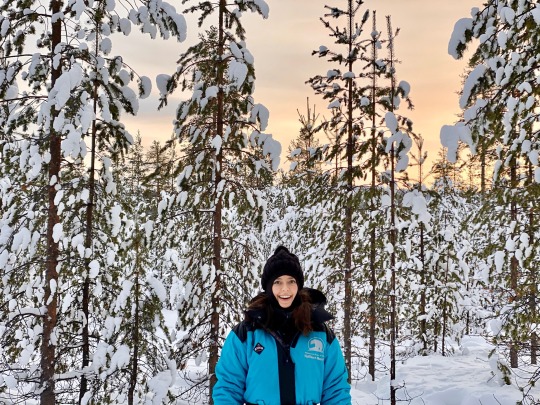
I’m writing this introduction from our flight from London Gatwick. It is 6:14 AM. Cold and rainy. We’ve been up since 4, and even my few hours of sleep were interrupted by relentless coughing. I should feel tired and angry.
But instead I’m bursting with anticipation - like my body can’t handle the excitement (maybe that’s the reason for my cough?).
This is Chelsay and I’s first weekend trip, and as the plane makes its way to the runway, I’m remembering the #1 reason we moved back: accessible travel, starting with this weekend’s trip to the Finnish Lapland.
Our second round of European adventures began with this road trip to Nellim, Finland, an extremely remote town of 150 people tucked 250 miles into the Arctic Circle, just five miles from the Russian border.
However, before writing about our three days in Finland, I want to quickly cover our first three weeks in London.
I could talk about our return to Richmond Park, about our walks through Soho and the reminders of how “cool” London is, or about how we found our flat in Hampstead within 24 hours of arriving... All of that was great, but I really only want to write about one thing: Indy.
Yes, 12 year old Chelsay’s dream finally came true. As a kid, she’d tell her mom she was going to live in London (...she watched a lot of Mary Poppins). She would have a great job and a nice husband. But most importantly: she would have a border collie named Indiana Jones. This dream came true when Chels and I traveled up to Derby, England to visit a puppy litter. All of the puppies had chubby butts, but our little Indy was easy to spot: tail wagging, stomping over his puppy siblings, and already showing affection to his new parents. It was love at first site.
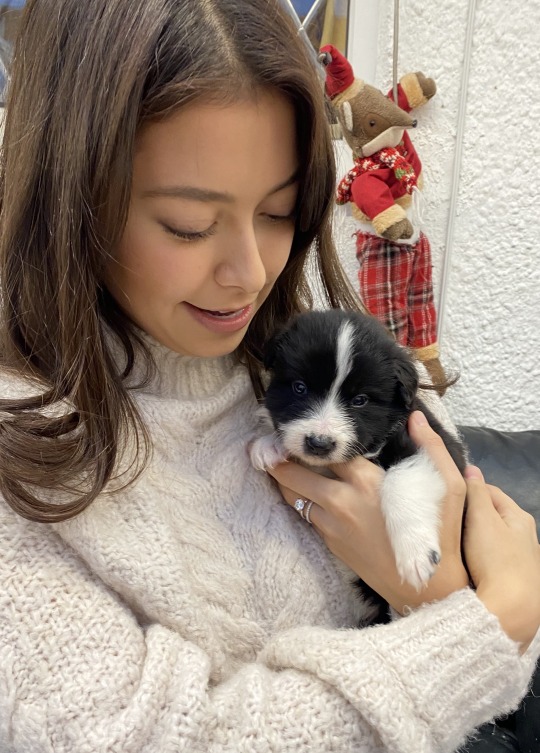
We won’t get to take little Indy home for a few more weeks, but that hasn’t slowed Chelsay’s “puppy mom” obsession. We bought his crate and fence on the ride home from Derby. We’ve been watching hours of dog training videos on YouTube. I’m receiving dozens of texts each day with the same puppy picture. ...Who am I kidding though? I’m just as much of an obsessed “puppy dad”.
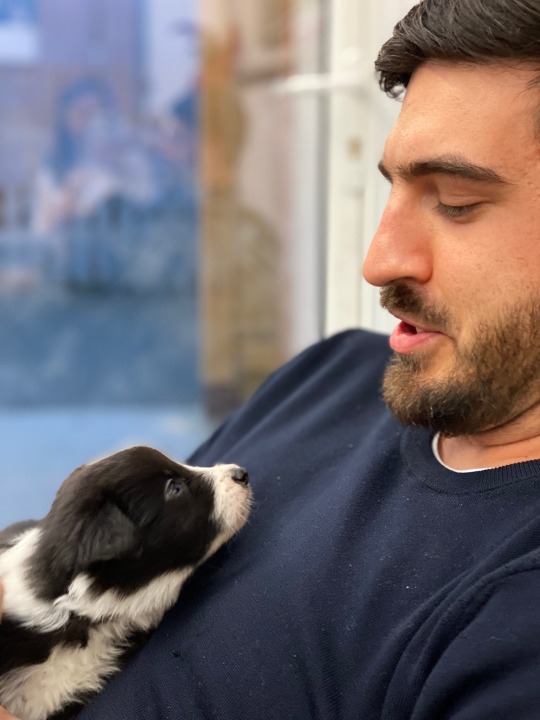
That one Indy story means you’re caught up on our first three weeks in London. Back to our first trip.
There’s always a buzz when you’re going somewhere new, and that’s especially true in Europe. Every country is so accessible yet so unique. Spain is nothing like Sweden nor Morocco. They’re all just three hours away, but might as well be on different planets.

This was proven true as our plane descended into Finland. The landscape was whiter than a Dave Mathews concert. Snow everywhere. No patches of civilization, just patches of evergreen forests covered in more white. We took off in metropolitan London and landed literally in the Arctic Circle.

If this was evident on the flight in, it became especially clear as we left the airport. I asked our rental agent for the car keys and he looked back at me as if it were obvious: “They’re in the car - I started it 30 minutes ago.”
As we stepped out the airport doors, I realized why this should’ve been obvious — and also why his directions to the car were so emphatic. Everything was frozen, including the car had he not started it earlier. Chelsay and I would’ve been frozen too if we didn’t literally dive into the car.
After barely avoiding frostbite, my first thought upon hitting the road was “How can people survive here?” It’s just snow, ice, and sub-zero temperatures for months!
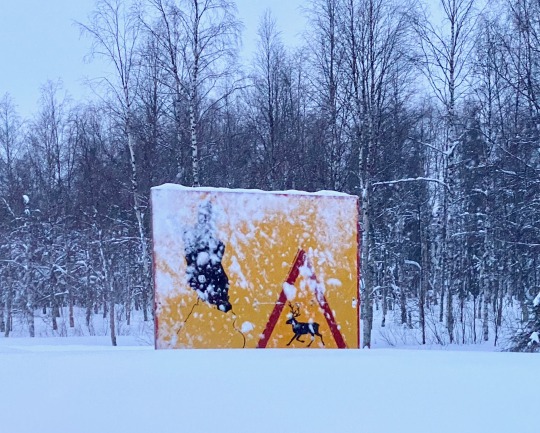
youtube
But the Finnish rightly play up their winter wonderland. In fact, it’s close enough to the North Pole that Lapland claims to be the Home of Santa. Yes, of all the places in the entire world, Santa chose Rovaniemi, Finland to set up shop. What an honor.

After a brief stop at Santa’s offices, we hit the road for our four-hour drive to Nellim. This place is remote, and that was exactly the intention. My two goals for the trip were (1) to see the Northern Lights and (2) to walk through snowy, silent Finish forests. Heading as far into Lapland as possible gave us the best chances for both.
The drive was a breeze: we had studded tires for the icy roads, and a James Acaster audiobook for entertainment. Plus the landscape kept us in awe - tall spruce forests lined the roadway and the black concrete was covered in ice, loose snow whipping around in the wind.
youtube
We were conscious of daylight on our drive up. In winter, the sun technically rises at 9:30 AM and sets at 3 PM. I say “technically” because there is actually far more daylight thanks to Nautical and Civil twilight, two things I’d never heard of before this trip. Given Lapland’s latitude, sunrise and sunset last about two hours each — rather than have a defined light time and dark time, Finnish days are just caught in perpetual semi-visibility... In addition to being “Home to Santa”, Lapland is apparently also the Twilight Zone.
Stop it Mike.
Anyway, we arrived at Nellim Wilderness Resort after sunset and nautical twilight and civil twilight and any other twilight. It was dark, but there were still a few activities available our first evening.
First, our resort had an illuminated sled hill. We didn’t know about the sledding beforehand, but once we’d seen it, Chelsay and I couldn’t resist.
Our riding styles were absolutely on brand: Chelsay laughed and screamed the entire way down (reminding me of our ride on The Mummy roller coaster at Universal Studios).
youtube
Meanwhile, I took sledding to an extreme by riding headfirst (likely breaking my ribs with what Chelsay called “The Salmon Jump”), then later trying to surf down (likely breaking my back with what Chelsay called “The Concussion Tumble”).
youtube
youtube
We were in the right country to recover from our (my) frigid falls, because the Finns love a hot sauna. In fact, they invented it! 1000 years ago, some Viking named Olaf probably tried that sled-surf thing, and a smoky sauna was his novel therapy!
Luckily the resort’s saunas were private, because similar to sled-surfing, I introduced a new twist to an old tradition: no one in the history of saunas has ever sweat as much as I did. Olaf included.
Outside of sledding and saunas, the other big nighttime activity in Lapland is searching for the Aurora Borealis. The Northern Lights are fairly common this time of year: about 50/50. The problem was the weather was due to be overcast & snowing throughout, so Chelsay and I came in with zero expectation.
We mentioned this to the receptionist at Nellim, but she wasn’t giving up hope. She said to keep our eyes peeled for stars: if you can see the stars, there’s a break in the clouds and a chance to see the Aurora. It didn’t hurt that our room was 50% window.
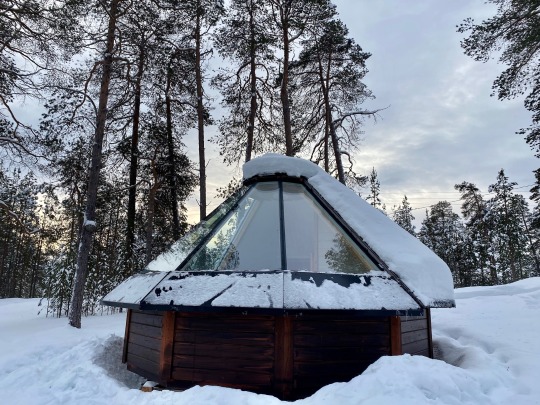
Just as the receptionist predicted, we saw stars from about 10:30 to midnight. Staring out felt like being on a hunt, eyes dashing from one side of the sky to the other in hopes of seeing a green flash. Eventually I fell asleep, but the resort offers an Aurora alarm in case the lights appear.
Unfortunately there were no alarms either night.
I’d be lying if I said I wasn’t disappointed - the Northern Lights were one of the main reasons for visiting, and the brief star sightings provided a cruel tease of unwarranted hope. But the Aurora is just weather after all, and as the sun rose the next day, we remembered how cool it was to be in Nellim, Finland. Plus, the flip side of this snowy cloud cover was a clean and white-coated winter wonderland.
The fresh snow was perfect for our first activity of the day: dog sledding. These huskies were dying to get out and run, and I’ll never forget their excited gallop as we burst through the trees onto an open, frozen lake.
youtube
youtube
Chelsay and I switched off as driver, both flirting with danger. Chelsay nearly led us into Russia, while I ghost rode the sled. If you’re not familiar with ghost riding, it’s where you hop out of a moving (now driverless) vehicle and run beside it. Based on the look in our dogs’ eyes, I’m not sure they’d seen this before.
After the morning excitement, Chelsay and I had earned extra whipped cream on our hot chocolates. I’ll briefly mention the dining, which we both surprisingly enjoyed. Finnish food is not traditionally exciting (a lot of lingonberry and reindeer), but the Wilderness Resort came through for each meal: tasty lamb shanks, potatoes gratin, mushroom risotto, panna cotta, and more. And obviously a lot of hot chocolate.


We regained enough energy over lunch for our afternoon activity: snow shoeing. We planned to be out for a few hours, so bundled up in three layers of everything: socks, leggings, sweaters. We even doubled up on gloves.
Now insulated from the sub zero temperatures, we were motoring around the quiet, empty wilderness in no time. Nothing but clean snow and creaky timber for miles. Chelsay said it reminded her of the land of swirly twirly gumdrops from Elf: “Byeee Buddyyyy”
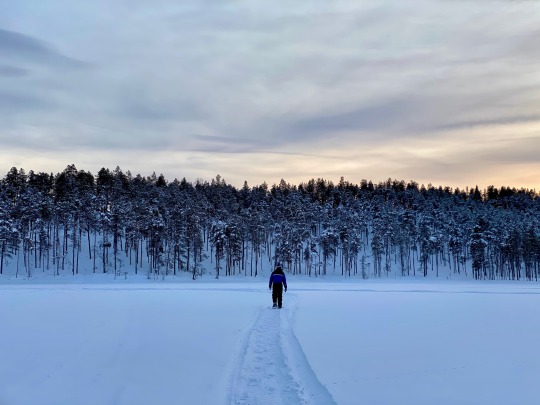
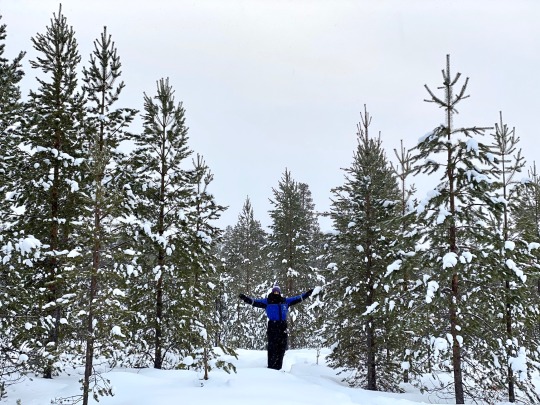
We climbed up hills, slid down slopes, trekked across frozen lakes, forged our own paths through the deep snow, and tracked the only other footprints we could find: wolf and reindeer.
youtube
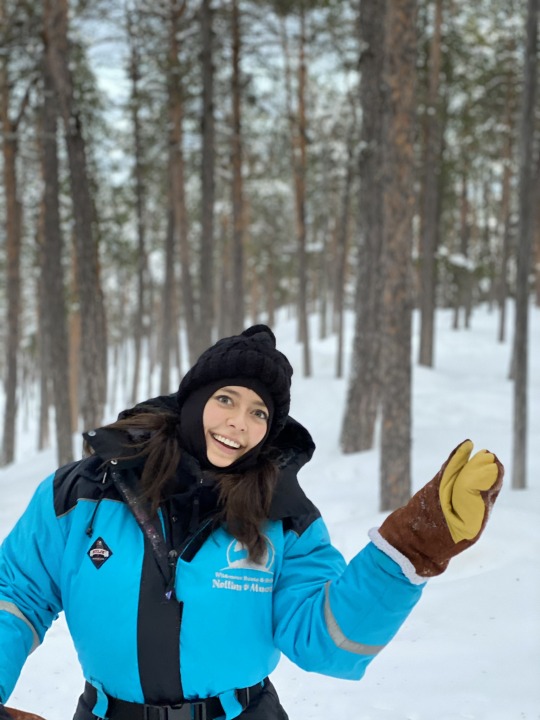
Just as the sun was setting (at 3 PM), Chelsay and I stumbled into a peaceful and perfect grove. It was a beautiful setting and the most memorable moments I’ll take from the trip.

The evergreen branches were coated in snowy white clumps, the crisp air was cold in our chests, and the only sound we could hear was crunch... crunch... crunch... as we gently shuffled across the deep snow.
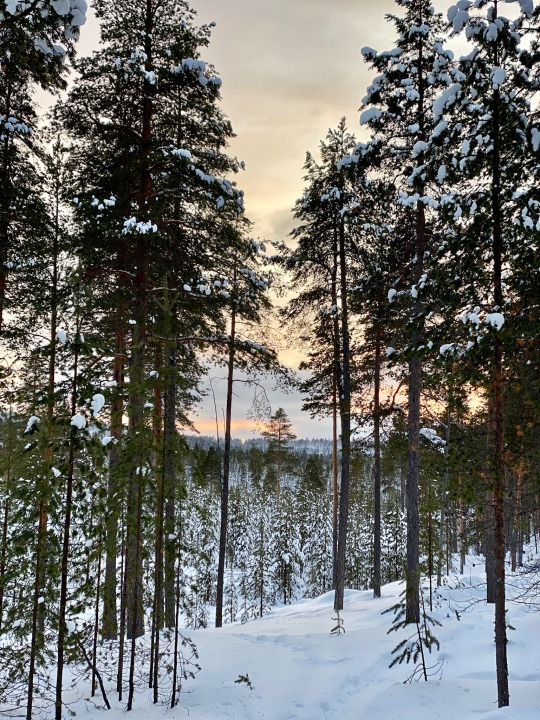
We returned to our room with that “exhausted but content” feeling. Our quads were burning but we’d accomplished what we came for.
That night, we enjoyed another remedial sauna - this one was somehow sweatier than the last. We didn’t have any energy or unbroken bones left for sledding that night, so we instead stayed in our room and watched Parasite (great movie) while sipping hot chocolate. I doubt I’ll remember what JOMO meant when I read this in 20 years, but this night describes it well.
We were making the long drive back to Rovaniemi around lunch the next day, but had plenty of time for morning walk. This time we attempted to go without snow shoes, but quickly realized that walking through deep snow is hard! Your feet sink with every step, and you have to contort your legs up & out of the snow to make any progress.
youtube
Chelsay compared it to the Sahara, except instead of sinking ankle-deep in sand, we were literally waist-deep. Luckily we persevered long enough to stumble across a pack of reindeer.
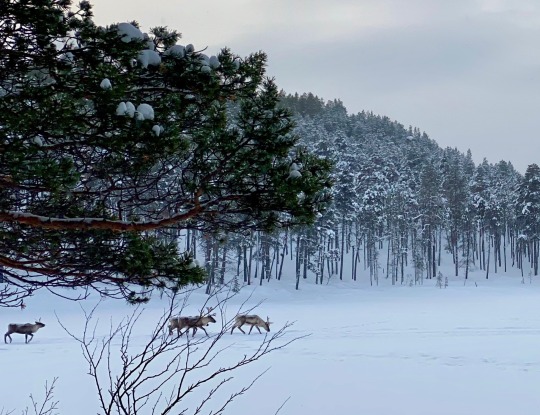
With our quads burning, we figured the reindeer sighting was a good enough cap to our Lapland adventure. Sure, I wish we’d seen the Northern Lights, but Chelsay and I are still very content with our first trip back in Europe.
I say that without any doubt. Rewinding to our flight from London: Lapland’s frozen landscapes exceeded the “new city” excitement I felt as our departing plane rolled toward the runway.
Lapland is a different planet: part winter wonderland, part uninhabitable wasteland. Its frigid wilderness is unlike any of the previous places we’ve visited, but the craziest part is that it was all so easily accessible. Chelsay and I were 250 miles into the Arctic Circle, literally a short walk into Russia’s northernmost territories, yet remained just a three hour flight from London.
That’s why we moved back: because every trip Chelsay and I take has the potential to bring us somewhere new, special, and completely different from anywhere we’ve ever been.
I can’t wait for our next departing plane to roll its way to the runway.

0 notes